Recordings
Selected Shorts: Parents and Children (2013)
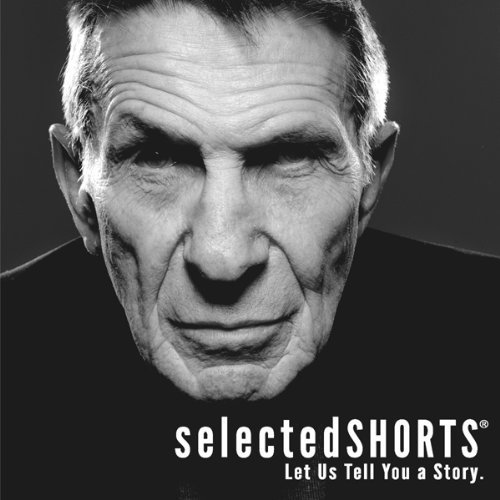 Leonard Nimoy reads In Dreams Begin Responsibilities. "Adult children untangle their pasts in two stories about fateful marriages and what comes down from parents to children." (more/close)
Leonard Nimoy reads In Dreams Begin Responsibilities. "Adult children untangle their pasts in two stories about fateful marriages and what comes down from parents to children." (more/close)
June 30, 2013
Parents and Children with guest host Jane Curtin
Adult children untangle their pasts in two stories about fateful marriages and what comes down from parents to children.
Delmore Schwartz’s classic “In Dreams Begin Responsibilities” established his reputation as a new literary voice when it was published in 1937 in The Partisan Review. Written on his 21st birthday, it describes a surreal dream in which his parents’ courtship is viewed as an old-time movie. SHORTS’ literary commentator Hannah Tinti says that this is an irresistible narrative, because we are all fascinated with our parents’ lives and “how we began.” The powerful read is by Leonard Nimoy.
Source: selectedshorts.org
Leonard Nimoy, Jane Kaczmarek, Robert Sean Leonard, Anika Noni Rose, Alison Pill, Josh Radnor, Kate Burton, and Other Top Actors Lend their Voices to Acclaimed Literary Series at Getty
LOS ANGELES—Selected Shorts: A Celebration of the Short Story, the popular public-radio series, returns to the Getty March 23 and 24 with live readings of short fictions about our favorite leisure activities. Actors from stage and screen perform stories about the pleasures and travails of all the things we love to do—from baking to ballroom dancing, card playing to movie watching, and knitting to sex.
This year's stellar lineup includes performances by Leonard Nimoy, Jane Kaczmarek (Malcolm in the Middle), Robert Sean Leonard (House M.D.), Anika Noni Rose (The Good Wife), Alison Pill (The Newsroom), Josh Radnor (How I Met Your Mother), Kate Burton (Scandal), and more. Joyce Carol Oates, John Cheever, Etgar Keret, Tess Gallagher, and Dorothy Parker are among the authors whose stories will be read.
“We look forward all year long to our Selected Shorts tour to the Getty, where the audiences are the most enthusiastic around!” said Selected Shorts producer Katherine Minton. “This year’s readings—all around the theme of favorite free-time activities—are wonderfully wide ranging, from Dorothy Parker’s deliciously dry monologue of a wallflower in a ballroom longing to find a waltzing partner to Steven Millhauser’s fanciful and poignant tale of childhood summers spent racing around the neighborhood on flying carpets.”
Selected Shorts: A Celebration of the Short Story is produced by New York's Symphony Space and presented by the J. Paul Getty Museum.
Selected Shorts: A Celebration of the Short Story was started in 1985 with a simple premise: take great stories by well known and emerging writers and have them performed by terrific actors. The performance and reading series has grown into a national, public radio sensation heard on over 140 stations and by over 300,000 monthly podcast subscribers. The radio series is co-produced with WNYC in New York and distributed by Public Radio International.
Dates: Saturday, March 23 and Sunday, March 24, 2013
Time: 3:00 p.m. and 7:00 p.m. on Saturday; 3:00 p.m. on Sunday
Location: Harold M. Williams Auditorium, Getty Center
Source: getty.edu/press-materials/
To try and catch one of the shows in which Mr. Nimoy is reading a story please check Selected Shorts: On Air for dates.
Selected Shorts: Dreams and Schemes (2013)
 The Catbird Seat by James Thurber. "The story of a man who is so disturbed by a change in his life that he plans to commit murder." (more/close)
The Catbird Seat by James Thurber. "The story of a man who is so disturbed by a change in his life that he plans to commit murder." (more/close)
Selected Shorts: Dreams and Schemes
Sunday, January 27, 2013
Guest host Neil Gaiman introduces two American classics.
The late science fiction writer Ray Bradbury’s story “The Veldt” was first published in 1950 in The Saturday Evening Post with the title “The World the Children Made,” which is a good description of what goes on in this eerie tale. It imagines the “model home” of the future, including a programmable nursery that becomes the site of a power struggle. Gaiman says that Bradbury’s tale raises complex questions: “Are our children our own?”, and “What does technology do to them?” The deceptively low-key read is by political satirist and television personality Stephen Colbert.
Next, classic humor from James Thurber, who drew on the zesty vocabulary of sports commentator Red Barber to fashion this tale of a mild-mannered office manager plotting revenge on a pushy efficiency expert. Leonard Nimoy is often heard on SELECTED SHORTS reading sober stories by writers such as Raymond Carver and Evelyn Waugh. But he gives an extravagantly funny performance in James Thurber’s “The Catbird Seat.”
Source: WNYC
Download it here: http://store.symphonyspace.org/products/the-catbird-seat-by-james-thurber
Selected Shorts: A Passion for Central Park with Paul Auster (2012)
 "Leonard Nimoy and other Broadway and Hollywood actors read selections by Auster, Colson Whitehead, Susan Cheever and more." (more/close)
"Leonard Nimoy and other Broadway and Hollywood actors read selections by Auster, Colson Whitehead, Susan Cheever and more." (more/close)
Selected Shorts: A Passion for Central Park with Paul Auster
Wed, May 23 at 7 pm
Peter Jay Sharp Theatre at Symphony Space
Central Park is much beloved by New Yorkers, tourists, and artists of all kinds, including hundreds of writers, whose characters have walked through, kissed, killed, birdwatched, played football, played tennis, run, fallen in love, fallen out of love and been inspired by this beautiful oasis in a busy, noisy city. In an evening of selections mostly drawn from the new collection Central Park, edited by Andrew Blauner, Paul Auster will open the evening by talking about how the park has been his muse. Leonard Nimoy and other Broadway and Hollywood actors read selections by Auster, Colson Whitehead, Susan Cheever and more.
Source: Symphony Space
A message from Leonard Nimoy for listeners of Selected Shorts
April 21, 2013
A Passion for the Park
This week, we celebrate Central Park and the wonderful heartbreak of baseball.
It’s not easy being green in New York City, but Central Park has been an oasis in a land of high rises since the late 19th century, and its natural beauty and unique character have inspired many writers. Some of those writings were collected in Central Park: An Anthology, edited by Andrew Blauner, and were part of a special program at Symphony Space.
We’re featuring two pieces from the anthology. First, an excerpt from Colson Whitehead’s The Colossus of New York—a funny, peripatetic stream-of-consciousness stroll through the Park in spring, and Susan Cheever’s “My Little Bit of Country.” Whitehead says that New Yorkers stream into the Park “hardly aware of the biological imperative” and encounter everything—young lovers, yogis, unicyclists, dead squirrels, and “green.” Leonard Nimoy leads this tour. Cheever’s charming essay recalls the childhood magic of the park, and bemoans the fact that her writer father John uprooted his family to the suburbs. Broadway star Debra Monk voices Cheever’s love affair with “the natural wonderland that is wild enough to delight.”
In between, an excerpt from Walter Dean Myers’s memoir Bad Boy, which chronicles his troubled childhood and yearning to write. He remembers it as a place of both escape and discovery, where he climbs trees and first reads James Joyce.
The program concludes with another celebration of the rites of spring, if not of Central Park. The late baseball commissioner A. Bartlett Giamatti’s essay “The Green Fields of the Mind” (written, oddly for his Yale alumni magazine) is a favorite of ours, and was read by the author himself.
Source: selectedshorts.org
Bonnie made the trip to New York with a friend to see Mr. Nimoy at Symphony Space and shared her impressions of the performance with us. Many thanks for taking the trouble to write it all up and I wish I could have been there with you two. Read her story here.
Selected Shorts: The Lives of Things aka Objects of Desire (2012)
 In the Reign of Harad IV by Steven Millhauser. " [A] court miniaturist longs to create smaller and smaller worlds." (more/close)
In the Reign of Harad IV by Steven Millhauser. " [A] court miniaturist longs to create smaller and smaller worlds." (more/close)
Selected Shorts 2012: Objects of Desire
Date: Saturday, March 3 and Sunday, March 4, 2012
Time: 3:00 p.m. and 7:00 p.m. on Saturday; 3:00 p.m. on Sunday
Location: Getty Center, Harold M. Williams Auditorium
Admission: Tickets $20, students/seniors $15. Call (310) 440-7300 or use the "Get Tickets" buttons below.
The hit public-radio series returns for its annual weekend of live performance at the Getty. A great lineup of actors from stage and screen read funny, passionate, and mysterious classic and modern tales about objects of desire. Historical, religious, magical, humorous, beloved, or bewitched—every object tells a story.
Stuff Happens
Saturday, March 3 at 3:00 p.m.
"The Bureau" by J. Robert Lennon, performed by Kirsten Vangsness
"The Empty Room" by Jonathan Lethem, performed by Tate Donovan
"Why Don't You Dance?" by Raymond Carver, performed by Corey Stoll
"In the Reign of Harad IV" by Steven Millhauser, performed by Leonard Nimoy
More here.
 Here's a photo taken at the presentation at the Getty Center in L.A. Photo taken by Justin Root. Posted with permission. Thank you very much Grace for obtaining it.
Here's a photo taken at the presentation at the Getty Center in L.A. Photo taken by Justin Root. Posted with permission. Thank you very much Grace for obtaining it.
September 28, 2012
The Lives of Things
The new season of SELECTED SHORTS begins with a program focusing on the mystery and allure of objects. In Steven Millhauser’s “In the Reign of Harad IV” a court miniaturist longs to create smaller and smaller worlds. Millhauser has commented on the fact that he moved from novels to short fiction—a reverse of the usual trend for authors—saying, “It’s as if the novel were a kind of preparation for the rigorous pleasures of the shorter form. For me, the shortness of a great story is part of its greatness.”
SHORTS literary commentator Hannah Tinti comments: “It made me wonder if he was like the miniaturist in his story, moving from writing novels to stories. That there is somehow more beauty in something that is smaller and contained. A microcosm of the world.”
The reader at the Getty Center in Los Angeles is the distinguished actor, director, and photographer Leonard Nimoy.
Source: selectedshorts.org
Conquer Monster EP (2012)
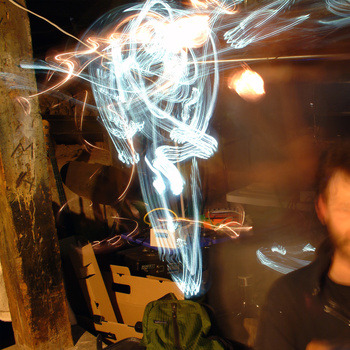 An Introduction Read By Leonard Nimoy from Conquer Monster EP by Conquer Monster.
An Introduction Read By Leonard Nimoy from Conquer Monster EP by Conquer Monster.
Selected Shorts: Two Tough Love Stories (2012) aka Delicious Fictions (2011)
 Leonard Nimoy did another reading for the Selected Shorts series at the Harold M. Williams Auditorium at the Getty Center in L.A. on March 27, 2011. The motto was Delicious Fictions. He performed "What We Talk About When We Talk About Love" by Raymond Carver. (more/close)
Leonard Nimoy did another reading for the Selected Shorts series at the Harold M. Williams Auditorium at the Getty Center in L.A. on March 27, 2011. The motto was Delicious Fictions. He performed "What We Talk About When We Talk About Love" by Raymond Carver. (more/close)
Mr. Nimoy's reading of Raymond Carver's “'What We Talk About When We Talk About Love,' in which two hard-drinking couples review their lives and loves" is available on the Selected Shorts webpage.
Many thanks go to Grace for the alert.
Selected Shorts: Two Tough Love Stories
Sunday, January 29, 2012
Love has been the inspiration for many stories, often romantic and rose colored, but on this program, we’re featuring two stories that are about the tougher side of love, or how you sometimes have to go through tough times to find true love.
The first is the classic anthologized and often imitated “What We Talk About When We Talk About Love,” by the godfather of modern American short stories, Raymond Carver.
Just as the title promises, the two couples sitting around a bottle of gin in the late afternoon begin a long winding road of reminiscences about their loves and former marriages. SHORTS literary commentator Hannah Tinti notes “What We Talk About When We Talk About Love” is the title story of Raymond Carver’s third collection of stories, which was published in 1981. Carver was born in 1938 in Oregon and grew up in Washington. He’s known as both a poet and a master of the short story, and has influenced an entire generation of writers, including me. Reading Carver’s stories really transformed my writing and my life.”
She continues, “In 2007, with the permission of Carver’s widow, Tess Gallagher,
The New Yorker did a great piece where they showed Carver’s original draft of “What We Talk About When We Talk About Love,” (Carver had originally titled it “Beginners”) and published it side-by-side with the version edited by Gordan Lish—his longtime editor—showing all the cuts and re-written sections.” Here is a link to that feature: Primary Sources: "Beginners," Edited.
The Carver story is read grandiloquently by Leonard Nimoy. It contains a prodigious amount of social drinking, by current standards, and Nimoy commented to host Isaiah Sheffer, “I don’t drink, but this would be a story to attempt to read with a large glass of Scotch in your hand!”
Source: WNYC
Observations: Symphonic Encounters from Galileo to the to the Space Age (2011)
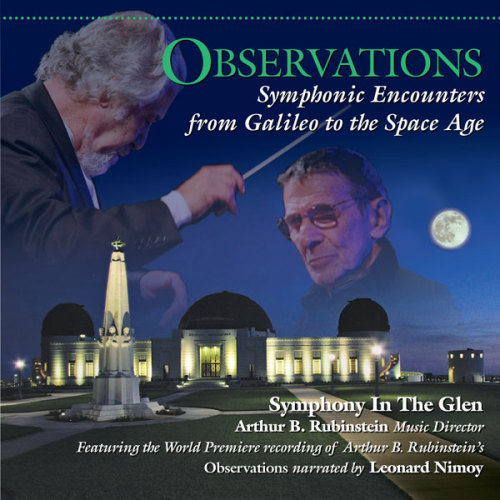 An original composition by Arthur B. Rubinstein, narrated by Leonard Nimoy. (more)
An original composition by Arthur B. Rubinstein, narrated by Leonard Nimoy. (more)
Too Young for Yiddish (2010)
 Leonard Nimoy reads a story by Richard Michelson. You can listen to it here.
Leonard Nimoy reads a story by Richard Michelson. You can listen to it here.
Selected Shorts: At Home (2010) aka Happy Families (2011)
 The Getty Museum presents "Selected Shorts: A Celebration of the Short Story". On May 1st Leonard Nimoy read Porte-Cochère by Peter Taylor. The motto for the evening's performance is At Home. Here is a review of the event. It was broacast as "Happy Families?" on WNYC on Sunday, January 30, 2011.
The Getty Museum presents "Selected Shorts: A Celebration of the Short Story". On May 1st Leonard Nimoy read Porte-Cochère by Peter Taylor. The motto for the evening's performance is At Home. Here is a review of the event. It was broacast as "Happy Families?" on WNYC on Sunday, January 30, 2011.
Selected Shorts: Lost and Found (2010) aka Loss and Recovery (2011)
 Leonard Nimoy reads Etgar Keret`s Good Intentions, a "darkly comic tale of a professional hit man whose latest assignment calls him to question his line of work." The podcast you're looking for is Lost and Found. Good Intentions is the first story in the stream. More here and at symphonyspace.
Leonard Nimoy reads Etgar Keret`s Good Intentions, a "darkly comic tale of a professional hit man whose latest assignment calls him to question his line of work." The podcast you're looking for is Lost and Found. Good Intentions is the first story in the stream. More here and at symphonyspace.
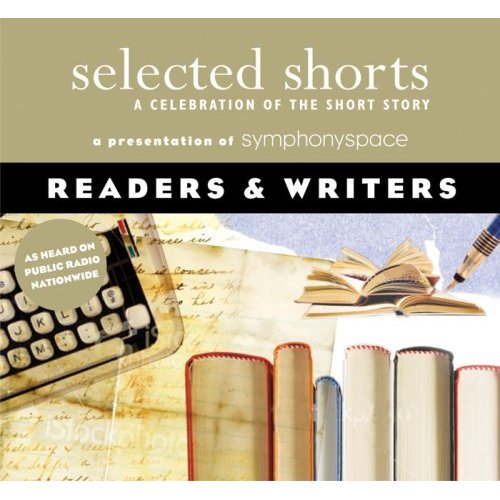 Leonard Nimoy reads The Man Who Liked Dickens by Evelyn Waugh. A husband flees his unfaithful wife, goes on an expedition, and ends up the captive of a manipulative illiterate in the deep jungle, who likes to have works by Charles Dickens read to him. The motto is Readers & Writers. Listen to an excerpt at Amazon
Leonard Nimoy reads The Man Who Liked Dickens by Evelyn Waugh. A husband flees his unfaithful wife, goes on an expedition, and ends up the captive of a manipulative illiterate in the deep jungle, who likes to have works by Charles Dickens read to him. The motto is Readers & Writers. Listen to an excerpt at Amazon
Gimpl, the Fool (2007)
 "Leonard Nimoy's masterful interpretation of one of Nobel Laureate Isaac Bashevis Singer's greatest stories. Though he appears simple-minded, Gimpel is a powerful character who plays the fool in the face of his wife's infidelities and his neighbors' derision." From the Nimoy Library of Recorded Jewish Books More here.
"Leonard Nimoy's masterful interpretation of one of Nobel Laureate Isaac Bashevis Singer's greatest stories. Though he appears simple-minded, Gimpel is a powerful character who plays the fool in the face of his wife's infidelities and his neighbors' derision." From the Nimoy Library of Recorded Jewish Books More here.
Willful Women & Personal Odyssey (2006)
 A Native American undertakes a personal odyssey; and Raymond Carver anatomizes grief. Sunday, May 14, 2006 & willful women in the American South and South America, Sunday, June 25, 2006. (more/close)
A Native American undertakes a personal odyssey; and Raymond Carver anatomizes grief. Sunday, May 14, 2006 & willful women in the American South and South America, Sunday, June 25, 2006. (more/close)
Willful Women
Sunday, June 25, 2006
“A woman who thinks too much can become dangerous. She’ll invent things. She’ll plot.” --Jose Alcantara Almanzar, “My Singular Irene”
Willful women in the American South and South America.
Eudora Welty lived a long time, from 1909 to 2001, and lived most of that life in her house in Jackson, Mississippi. She won the Pulitzer Prize in 1973 for her novel THE OPTIMIST’S DAUGHTER, and, in 1992, the Rea Award for the Short Story. This sassy tale of small town gossip, set—where else?—at a beauty salon—was the perfect showcase for comedienne Cynthia Nixon, one of the stars of the hit television series, SEX AND THE CITY.
The author “My Singular Irene,” José Alcántara Almánzar, has written five collections of short stories, many of which are gathered in the 1993 anthology, El sabor de lo prohibido. He lives and works in Santo Domingo, Dominican Republic. This comic and magical story, which starts with a couple on a journey in their car, was part of a SHORTS evening at Symphony Space called “Transformations”. With that in mind, listen for some amazing changes undergone by at least one person in that automobile. Some may be reminded of a similar scene in Gabriel Garcia Marquez’ One Hundred Years of Solitude. Reader Leonard Nimoy presents a masterful turn as a baffled male.
“Petrified Man,” by Eudora Welty, read by Cynthia Nixon
“My Singular Irene,” by Jose Alcantara Almanzar, read by Leonard Nimoy.
Source: WNYC
Personal Odyssey
Sunday, May 14, 2006
“Because they don’t want to be perfect, because only God is perfect, Indian people sew flaws into their pow wow regalia.”
--Sherman Alexie, “What You Pawn, I Will Redeem”
A Native American undertakes a personal odyssey; and Raymond Carver anatomizes grief.
“What You Pawn, I Will Redeem” is about homeless Native Americans in the city of Seattle, Washington, and follows its narrator through a dark night of the soul, into the light of a recovered past.
Sherman Alexie is the author of the story collections TEN LITTLE INDIANS, THE TOUGHEST INDIAN IN THE WORLD, and THE LONE RANGER AND TONTO FISTFIGHT IN HEAVEN. The reader is the stage and film actor Keir Dullea, iconic star of A Space Odyssey 2001, David and Lisa, and Space Odyssey 2010.
Raymond Carver is considered one of the masters of the American short story; his spare prose renders emotion even more powerfully than does excess. Carver’s story collections include: Furious Seasons (1977), What We Talk About When We Talk About Love (1981), Fires and Cathedral (both 1983), and If It Please You (1984). This poignant story of the death of a child, Lemonade, is given an equally powerful reading by Leonard Nimoy.
“What You Pawn, I Will Redeem,” by Sherman Alexie, read by Keir Dullea
“Lemonade,” by Raymond Carver, read by Leonard Nimoy
Source: WNYC
 Silent Snow, Secret Snow by Conrad Aiken. "The story tells of a boy named Paul Hasleman, who finds it increasingly difficult to pay attention to his classwork, and grows more distant from his family. He is, instead, becoming more and more entranced by daydreaming about snow." (more/close)
Silent Snow, Secret Snow by Conrad Aiken. "The story tells of a boy named Paul Hasleman, who finds it increasingly difficult to pay attention to his classwork, and grows more distant from his family. He is, instead, becoming more and more entranced by daydreaming about snow." (more/close)
Snow Poem
Sunday, July 03, 2005
"He stood still, and loved it. Its beauty was paralyzing beyond all words, all experience, all dream."
—Conrad Aiken, "Silent Snow, Secret Snow"
A dream poem written in the snow.
Pulitzer Prize-winning poet and short story writer Conrad Aiken was born in Savannah, Georgia and was a contemporary of T.S. Eliot’s at Harvard. His collections include Earth Triumphant and Selected Poems; his short story collections were Bring, Bring, and Among the Lost People, and he was also awarded the National Book Award for his surreal and penetrating fictions. He was a contributing editor and writer to The Dial and The New Yorker, and the father of children’s writer Joan Aiken. His mysterious and compelling fiction, “Silent Snow, Secret Snow” is compellingly read by Leonard Nimoy.
Source: WNYC
The shows are not available, in reply to a comment the producers wrote:
However, all the details about the authors and readers can be found on the individual program pages, and more information on where the stories featured on SELECTED
Update: The story is now available for downoad at http://store.symphonyspace.org/products/silent-snow-secret-snow-by-conrad-aiken-mp3-download
Prominent Jews Talk About Being Jewish at the 92nd Street Y (2005)
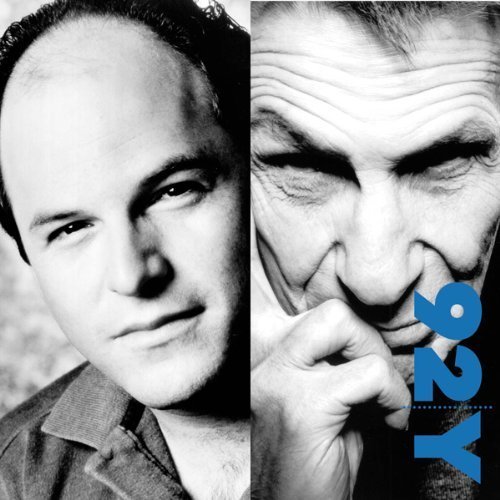 (more/close)
(more/close)
Some of America's most prominent Jewish entertainers talk about their Jewish identity (or lack of one) in a panel discussion at New York's 92nd Street Y. Speakers include Jason Alexander, Leonard Nimoy, and Kyra Sedgwick. These are just some of the personalities featured in the new book Stars of David: Prominent Jews Talk About Being Jewish by Abigail Pogrebin.
This event took place on November 16, 2005.
Listen to an excerpt at Amazon.
American Jewish Music from the Milken Archive. Radio Series with Leonard Nimoy. (2005)
 (more/close)
(more/close)
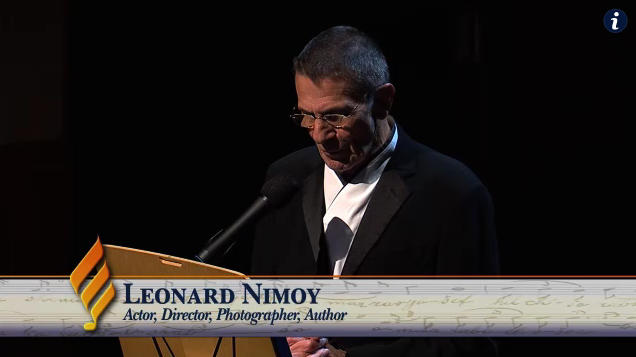 Available here are 7 episodes of American Jewish Music from the Milken Archive. Or here on iTunes.
Available here are 7 episodes of American Jewish Music from the Milken Archive. Or here on iTunes.
 American Jewish Music from the Milken Archive
American Jewish Music from the Milken Archive
Radio Series with Leonard Nimoy
The series of 13 two-part episodes, initially produced with WFMT and broadcast on radio stations around the nation, will delve into the rich body of Jewish music, both sacred and secular, that has developed over the course of American history. Every episode of this award-winning program will illuminate a major theme reflected in American Jewish music, including thrilling biblical epics set to music by Kurt Weill and other 20th Century masters; Jewish legends in tone poems, film scores and operas; sacred masterpieces and the great cantorial tradition; the joy of klezmer; symphonies and concertos based on Jewish themes; the mysteries of Sephardi music; Holocaust reflections; beloved songs from the Golden Age of Yiddish Theater; and world premieres of recently discovered Jewish compositions by Leonard Bernstein.
Episode Guide
Episode 6: Sacred Masterworks Part 1
Episode 6 of the critically-acclaimed radio series American Jewish Music from the Milken Archive with Leonard Nimoy inhabits the nexus between the synagogue and the concert hall with sacred masterpieces by some of the 20th-century's most influential composers. Part 1 features liturgical settings by Kurt Weill and Douglas Moore, excerpts from Darius Milhaud's Service Sacré, and an imaginative Kol Nidre service by Arnold Schoenberg. Includes commentary by Gerard Schwarz and Neil W. Levin.
Episode 5: Leonard Bernstein
Episode 5 of the critically-acclaimed radio series American Jewish Music from the Milken Archive with Leonard Nimoy explores this aspect of composer Leonard Bernstein's career in depth. From his first surviving complete composition—a setting of Psalm 148 as an art song for piano and voice written in his teens—to choral and orchestral masterpieces such as the Kaddish Symphony and Chichester Psalms, this program offers numerous insights on how Bernstein's faith, identity, and relationship with Israel served as a well of creativity and inspiration for some of his most important works.
Episode 4: Yiddish Music
Episode 4 of the critically-acclaimed radio series American Jewish Music from the Milken Archive with Leonard Nimoy, explores the golden age of the American Yiddish theater. Features songs by Sholom Secunda, Alexander Olshanetsky, Abraham Ellstein, Abe Schwartz, Ilia Trilling, and Solomon Shmulevitsh. Hear classics like Bay mir bistu sheyn and Mayn yidishe maydele, along with lesser known gems like Du shaynst vi di zun and A brivele der mamen. Commentary by Neil W. Levin and Gerard Schwarz.
Episode 3: Bible Stories
Episode 3 of the critically-acclaimed radio series American Jewish Music from the Milken Archive with Leonard Nimoy explores epic Biblical tales as retold by master composers of the 20th century. Featured composers include Arnold Schoenberg, Nathaniel Shilkret, Alexandre Tansman, Darius Milhaud, Mario Castelnuovo-Tedesco, Ernst Toch, and Igor Stravinsky.
Episode 2: Concertos
Episode 2 explored instrumental concert music on Jewish themes, featuring Joseph Achron's Violin Concerto no. 1, Joel Hoffman's Self-Portrait with Gebirtig for cello and orchestra, and Paul Schoenfield's Concerto for Viola and Orchestra, and many more; plus commentary and insight by Milken Archive artistic director Neil W. Levin and conductor Gerard Schwarz.
Episode 1: Introduction
Inaugural episode of the critically-acclaimed radio series American Jewish Music from the Milken Archive with Leonard Nimoy.Episode 1 introduced the Milken Archive, and featured music by Leonard Bernstein, Joseph Rumshinsky, Yehudi Wyner, Aaron Avshalomov, and Simon Sargon, as well as interviews and commentary with Lowell Milken, Neil W. Levin, and Gerard Schwarz.
Source: Milken Archive
Podcast Description
Leonard Nimoy hosts a 13-part series that celebrates the American Jewish tradition by exploring the extraordinary range of its music. Each program illuminates a major theme reflected in American Jewish music: biblical epics set to music by Kurt Weill and other 20th century masters; Jewish legends in tone poems, film scores and operas; sacred masterpieces and the great cantorial tradition; the joy of klezmer; symphonies and concertos based on Jewish themes; the mysteries of Sephardic music; Holocaust reflections; songs from the Golden Age of Yiddish Theater; and world premieres of recently discovered Jewish compositions by Leonard Bernstein.
Source: iTunes
LEONARD NIMOY HOSTS 13-PART RADIO SERIES
A new 13-part radio series - “American Jewish Music from the Milken Archives with Leonard Nimoy” - will begin web-casting on Naxos Web Radio (www.NaxosRadio.com) channels 46 to 48 beginning in October 2005. The series, hosted by Leonard Nimoy, who has a deep and abiding love for his Jewish heritage, will feature music from the Naxos series the Milken Archive of American Jewish Music, exploring a different theme in each two-hour program, for a total of twenty-six hours of unique and fascinating radio programming. The series can also be downloaded and streamed as podcasts in the ‘Podcasts’ section of www.Naxos.com (www.naxos.com/podcasts/podcastslist.asp).
The first program in the series gives an overview of American-Jewish music--its depth, breadth, and influence on all musical genres. Subsequent programs devote entire episodes to specific musical genres: Biblical epics set to music by Kurt Weill and other 20th-century masters; Jewish legends in tone poems; film scores and operas; sacred masterpieces and the great cantorial tradition; the joy of klezmer; symphonies and concertos based on Jewish themes; the mysteries of Sephardic music; Holocaust reflections; songs from the Golden Age of Yiddish theater; and world premieres of recently discovered Jewish compositions by Leonard Bernstein. Each program will include commentary and discussion about each of the weekly topics by Neil W. Levin, a recognized expert on Jewish music who is the artistic director of the Milken Archive, together with conductor and music director of the Seattle Symphony, Gerard Schwarz, who is featured on many of the Naxos - Milken Archive recordings. The series closes with a program of highlights from the entire series, with comments from Milken Archive founder Lowell Milken.
All of the music featured on “American Jewish Music from the Milken Archives with Leonard Nimoy” is from recordings released by the Milken Archive of American Jewish Music on the Naxos American Classics label, the most comprehensive survey of music related to the American Jewish experience ever assembled on disc, which explores the rich body of Jewish music, both sacred and secular, that has developed over the course of American history. In its breadth and diversity, this abundant repertoire encompasses classical music, sacred works, and theatrical, popular, and folk idioms, reflecting not only the evolution and variety of Jewish life in America, but also the universality of the Jewish experience and its relevance to people of all faiths and backgrounds.
The Milken Archive was created in 1990 by Lowell Milken, chairman of the Milken Family Foundation, who translated his enthusiasm for Jewish music and his family’s commitment to education into this extensive, multi-year project. The entire undertaking has been carried out according to exacting standards of scholarship by Artistic Director Neil W. Levin working with a distinguished panel of musicologists, performing artists, Judaic scholars and cantors, who chose the works to be recorded for their intrinsic musical value and appeal as well as for their Jewish character and inspiration. Introduced in September 2003, the Milken Archive has released 38 of more than 50 recordings to date of some 700 newly recorded works. The balance will be issued throughout 2006.
Nimoy to host Jewish music shows on XM Satellite Radio
Associated Press
Sept. 30, 2004, 9:10AM
NEW YORK -- Former "Star Trek" actor Leonard Nimoy is beaming onto the radio.
"American Jewish Music From the Milken Archive With Leonard Nimoy" will explore scared and secular Jewish music from the Milken Archive of Jewish American Music during 13 two-hour episodes on WFMT Radio Network stations and XM Satellite Radio.
The series will air beginning Sept. 30.
"I grew up speaking Yiddish at home in Boston and hearing this music during services at synagogue and at social events where my uncle and four cousins played klezmer music," Nimoy said in a statement Friday. "This program and this music makes me feel very much at home."
The series' musical selections will range from biblical epics set to music by Kurt Weill, Jewish legends in tone poems, film scores and operas, symphonies and concertos based on Jewish themes, Yiddish theater songs and world premieres of recently discovered Jewish compositions by Leonard Bernstein.
Source: Houston Chronicle
The Jewish Daily Forward
By David Mermelstein
December 31, 2004
Listening to Classical on the ‘Cool’ Medium
On the Radio
The Milken programs, each running two hours, derive their contents from a series of Milken Archive CDs on the Naxos label. (Currently, 30 titles are available of 52 projected.) Added to the music is Nimoy’s relatively dry commentary and excerpts from interviews in which conductor Gerard Schwarz questions Neil Levin, the archive’s artistic director.
Unusually, the series often presents works in their entirety, a gesture serious music lovers will welcome. Those interested in just sampling Jewish music might find listening to more than 40 minutes of Kurt Weill’s “The Eternal Road” a chore, but no one will discount this series’ value in making available music rarely heard and little known.
The Bible Stories program, for instance, features that bizarre collaboration known as “The Genesis Suite,” with music by several 20th-century composers, including Schoenberg and Stravinsky. Conducted by Schwarz, the Berlin Radio Symphony performs the piece, joined by the Ernst Senff Chorus. Barbara Feldon, Fritz Weaver and Tovah Feldshuh are among the narrators.
A program of concertos offers unfairly neglected works by Joseph Achron, Joel Hoffman, Paul Schoenfield, Sholom Secunda and Jacob Weinberg. And the incidental music that Yehudi Wyner wrote for “The Mirror,” a play by Isaac Bashevis Singer, enlivens the klezmer program. There are even two hours devoted to Bernstein’s music, nearly all of it unfamiliar, though none of it conducted by the composer.
Unfortunately, the series is not flawless. Nimoy’s narration, while authoritative, is muddily delivered. And the interpolated comments from Schwarz and Levin need drastic cutting. Not only do the “interviews” ramble, but they are also self-serving, undermining the very real value of this series.
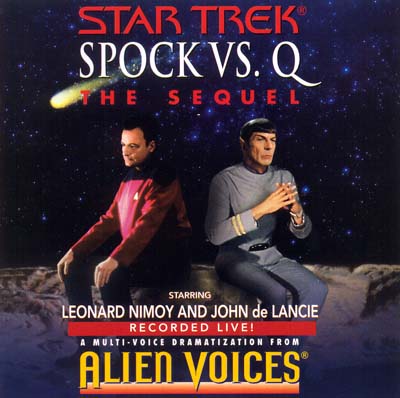 Spock and Q accidentally change personalities when a power surge happens.
Spock and Q accidentally change personalities when a power surge happens.
Go here for more.
Chanukkah In Story And Song (2000)
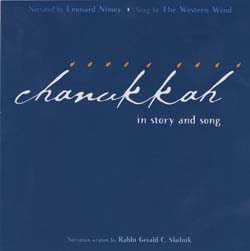 The "program presents 25 eclectic selections, from the Ladino songs of the Spanish Jews and Yiddish melodies of Eastern Europe to modern Israeli tunes and the ensemble's original version of "I Have a Little Dreydle." The ensemble performs a cappella as well as with instrumental accompaniment. The narration, written by Rabbi Gerald Skolnik, sheds new light on the holiday's customs and rituals." (more/close)
The "program presents 25 eclectic selections, from the Ladino songs of the Spanish Jews and Yiddish melodies of Eastern Europe to modern Israeli tunes and the ensemble's original version of "I Have a Little Dreydle." The ensemble performs a cappella as well as with instrumental accompaniment. The narration, written by Rabbi Gerald Skolnik, sheds new light on the holiday's customs and rituals." (more/close)
Chanukkah In Story And Song listen to it here
"Narrated by Leonard Nimoy and sung by the acclaimed vocal sextet The Western Wind Vocal Ensemble, Chanukah in Story and Song is a unique holiday program created especially for public radio listeners." |
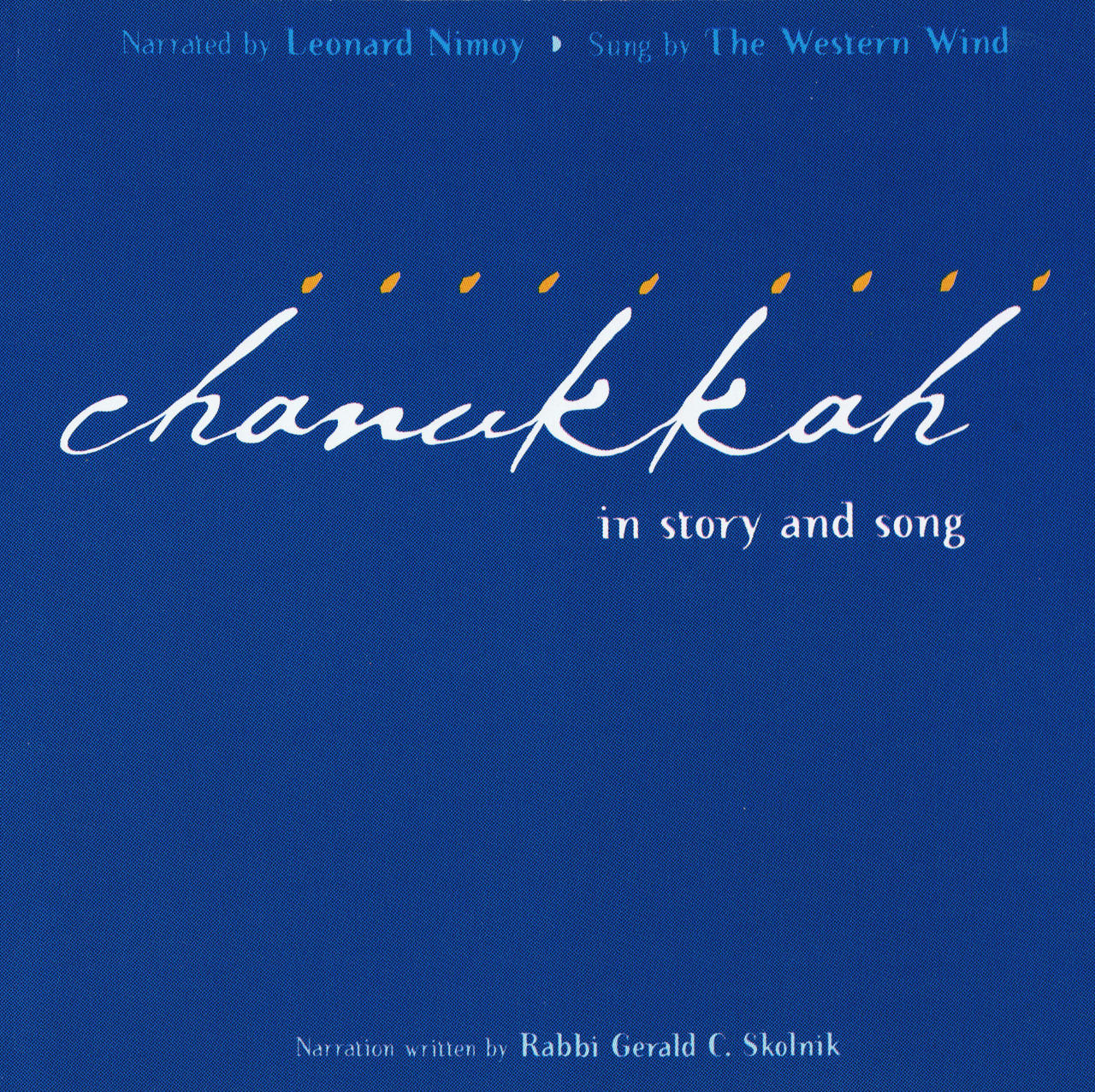 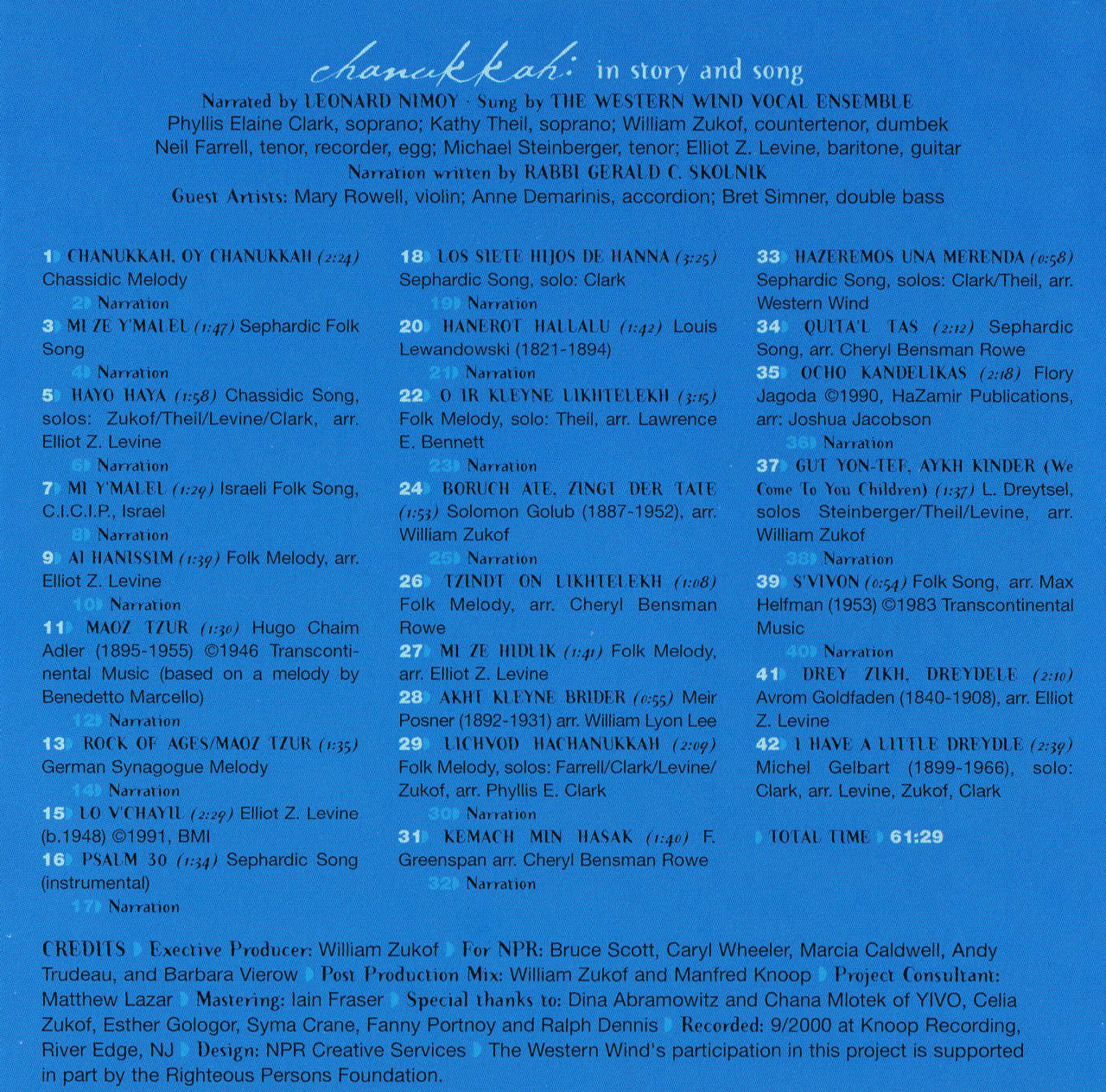 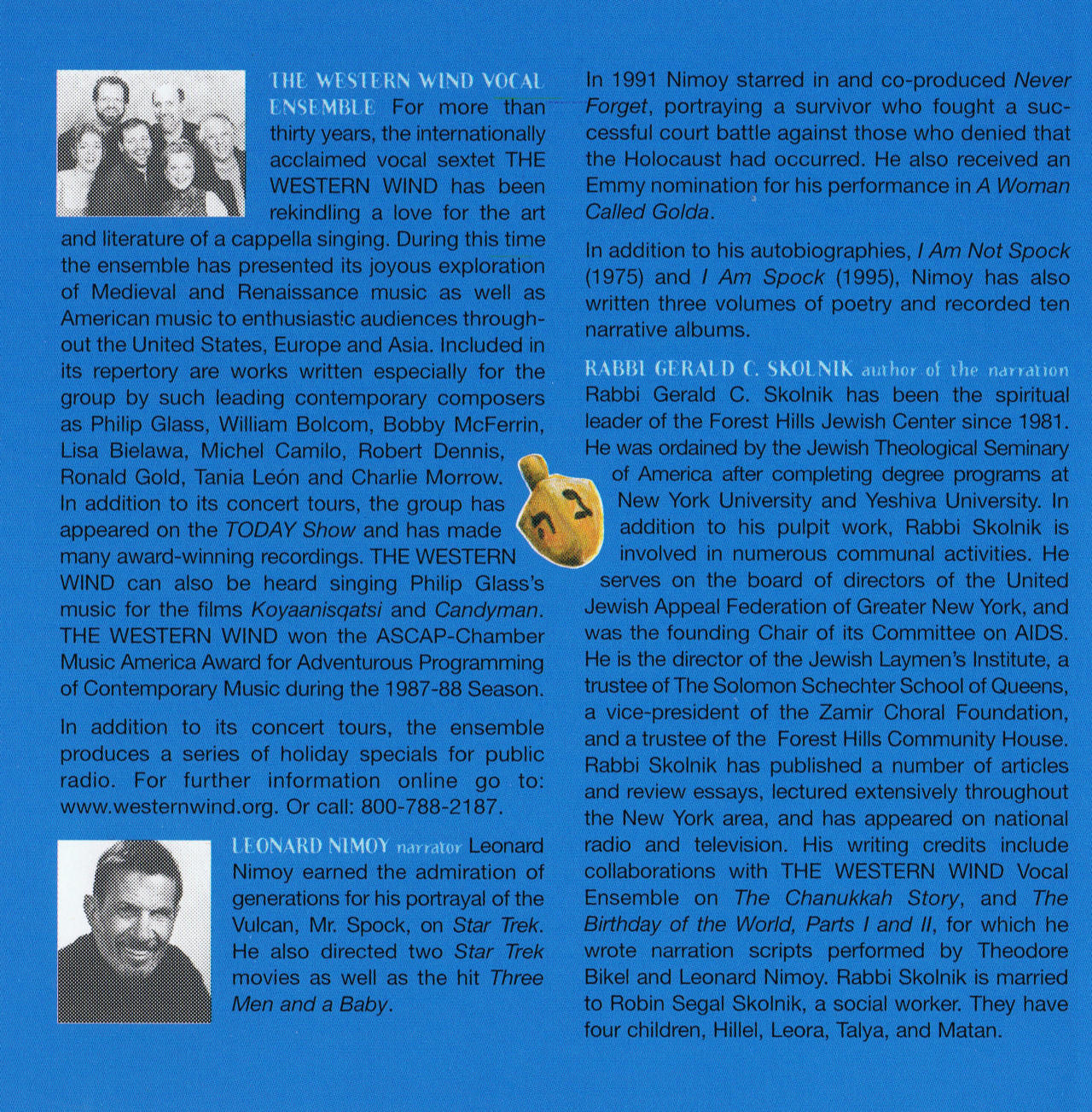 |
Jewish Stories From The Old World To The New (2000)
18 hour series distributed to public radio stations nationwide via National Public Radio. (more/close)
Leonard Nimoy provides the naration and reads # 4 Dreyfus in Kassrilevke" The news from France about the historic Dreyfus Affair reaches the small village of Kassrilevke through a single newspaper, delivered by post to the town's lone subscriber" and # 16 Shprintse "Sholom Aleichem's timeless character, Tevye the Milkman, reimagined in Fiddler on the Roof, meets every disaster with unshakable faith. This chapter from Sholom Aleichem's collection tells a cautionary tale about the conventions of sex and class."
While not properly displayed, the first button still works on the KCRW page and one can listen to the stories with Real Player.
Dec. 8, 1998 /19 Kislev, 5759
Hollywood goes heimish?
By Jon Kalish
WE MAY BE THE PEOPLE OF THE BOOK but with gems like KCRW's new anthology of Jewish stories, we could become The People Of The Compact Disk.
The Southern California public radio station has just released its second collection of Jewish stories read aloud by some of Hollywood's more prominent Jewish artists. If you are fortunate enough to live in one of the cities with public radio stations that have plans to broadcast "Jewish Stories From the Old World to the New," by all means tune in.
It is unclear whether WNYC in New York City will carry the programs but out on Long Island WPBX in Southampton will be airing them, as will WFHU in Fairfield, Connecticut. The 18-hour series will also be heard in San Francisco, Chicago, Cleveland, Philadelphia, Austin, Madison, St. Paul and Atlanta. The national network for the blind, In Touch, is planning to run an hour a day (repeated twice daily) during the eight days of Chanukah and the remainder in February and March. With the exception of its affiliates in New Orleans and Memphis, the In Touch network uses sub carrier frequencies to broadcast, so a special receiver is needed to pick up its signal.
Original klezmer music by Yale Strom is used to bridge the stories and the series is narrated by Leonard Nimoy, who seems to have found a second acreer in narrating documentaries with a Jewish focus. Nimoy's old Star Trek pal William Shatner is one of the stars who reads for the series. Edward Asner, Elliot Gould, Carl Reiner, Julie Kavner, Hector Elizondo, Jerry Stiller and JoBeth Williams read stories by I.L. Peretz, I.B. Singer, Itzik Manger, Sholom Asch, Bernard Malamud and E. L. Doctorow, among others. Richard Dreyfuss apparently declined to read Sholom Alechim's "Dreyfus in Kassrilevke," which deals with news of the Dreyfus Affair reaching the remote shtel of Kassrilevke. Instead the actor reads Alechim's "Hodel," in which Tevye's daughter gets caught up in the revolutionary passions of the day.
KCRW's manager, Ruth Seymour, is quite possibly the only public radio station manager in America who is fluent in Yiddish. She grew up in a "Workman's Circle home" in the Bronx and studied with Max Weinrich. Seymour's connection to Nimoy goes back quite a ways. Before Nimoy's ears got pointy, he produced radio drama at KPFK, the Pacifica station in Los Angeles where Seymour worked before taking over the reins at KCRW. The feisty station manager has built what was once a junior college radio station with a minimal listenership into a public radio powerhouse.
Excerpts of "Jewish Stories From the Old World to the New" are in RealAudio form on the KCRW web site. The entire 18-hour series is available on compact disk and cassette ($100 plus $5 shipping for the first set and $75 for each additional set) and those who are not inclined to order on-line can print out an order form from the web site and mail in a check. For telephone orders, call 1-800-292-3855.
Source: jewishworldreview.com
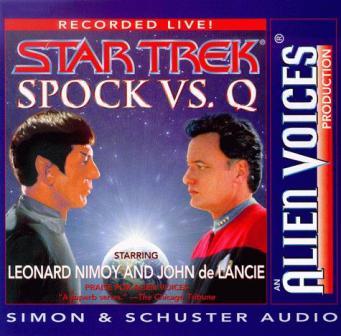 A battle of wits, with the continued existence of the human race put at risk to up the stakes.
A battle of wits, with the continued existence of the human race put at risk to up the stakes.
Go here for more.
Strangers from the Sky (1999)
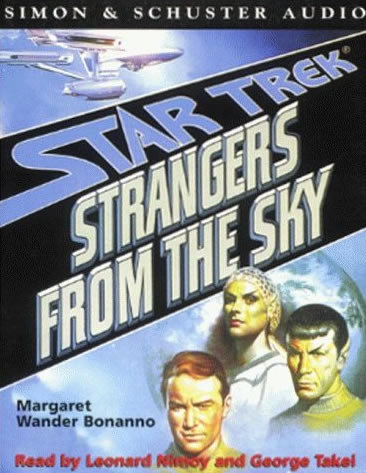 Simon & Schuster Audio; abridged edition edition (September 15, 1987)
Simon & Schuster Audio; abridged edition edition (September 15, 1987)
Souls on Fire (1998)
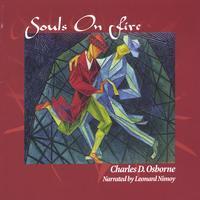 "Souls On Fire is a full-length oratorio that tells the story of the founders of European Hassidism. Based on the book by Elie Wiesel, adapted by Aryeh Finklestein. Narration by world renowned actor Leonard Nimoy." (more/close)
"Souls On Fire is a full-length oratorio that tells the story of the founders of European Hassidism. Based on the book by Elie Wiesel, adapted by Aryeh Finklestein. Narration by world renowned actor Leonard Nimoy." (more/close)
The First Men In The Moon
Journey to the Center of the Earth
The Invisible Man
The Lost World, Simon & Schuster Audio; Abridged edition (December 1, 1997)
The Time Machine Simon & Schuster Audio; Abridged edition (April 1, 1997)
Timed to coincide with Mr. Nimoy's and Mr. de Lancie's appearance at the Creation convention in Las Vegas in 2011, Mr. Nimoy posted a link on Twitter to their newly created Alien Voices website where they offer the audio recordings for download with a promise for more to come. Go to http://www.alienvoices.net/
Review of The Invisible man at SF Site
War of the Worlds (1997)
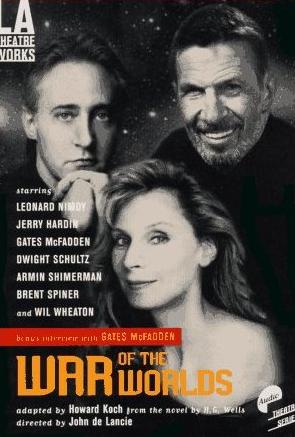 Listen to it at Southern California Public Radio, The Relativity Series or go here for more.
Listen to it at Southern California Public Radio, The Relativity Series or go here for more.
"Originally performed by Orson Welles and his Mercury Theatre of the Air, WAR OF THE WORLDS is truly the mother of all space invasions, offering a rare combination of chills, thrills and great literature."
Star Trek: Spock's World (1996), Star Trek IV: The Voyage Home (1996)
The Silver Lining (1996)
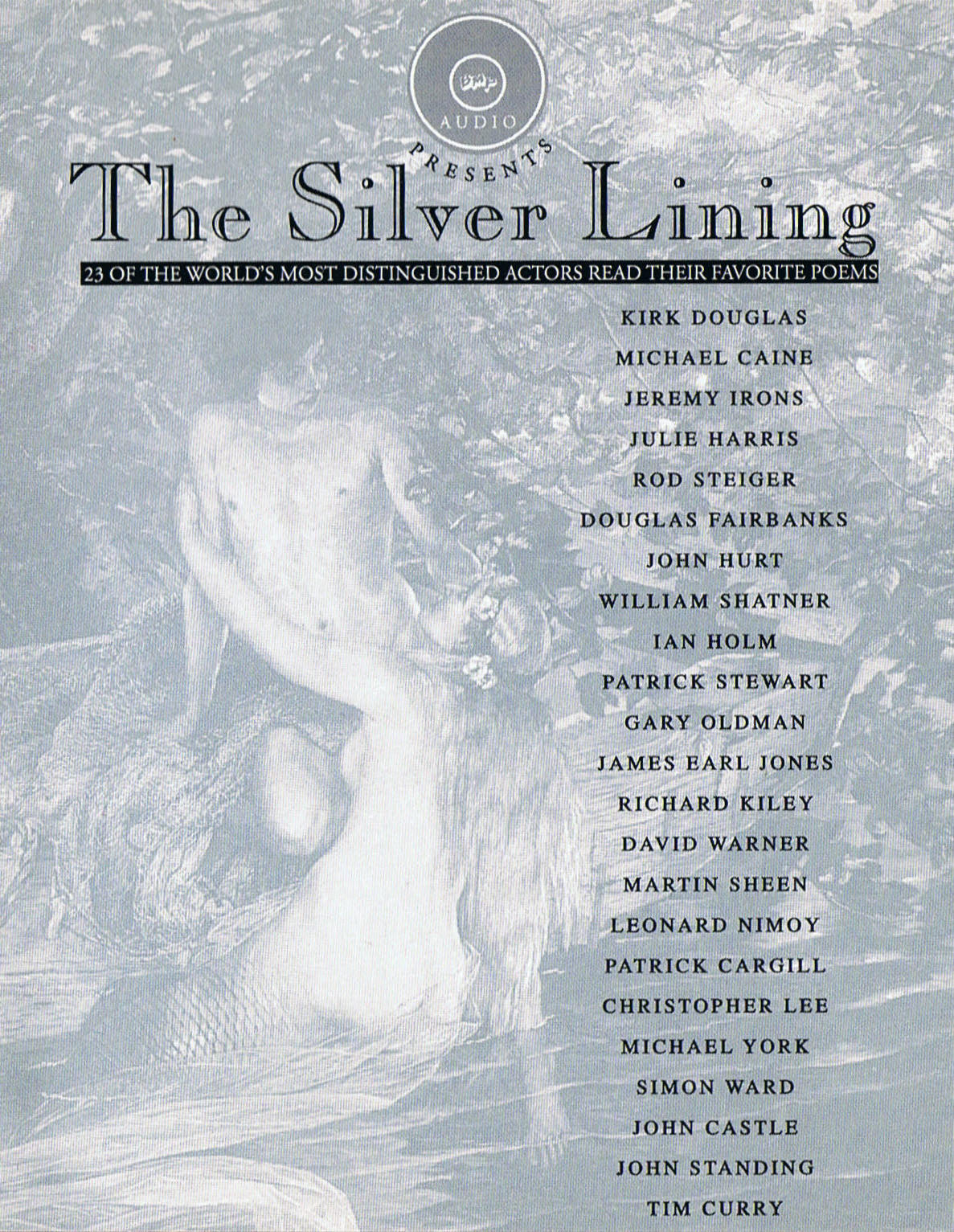
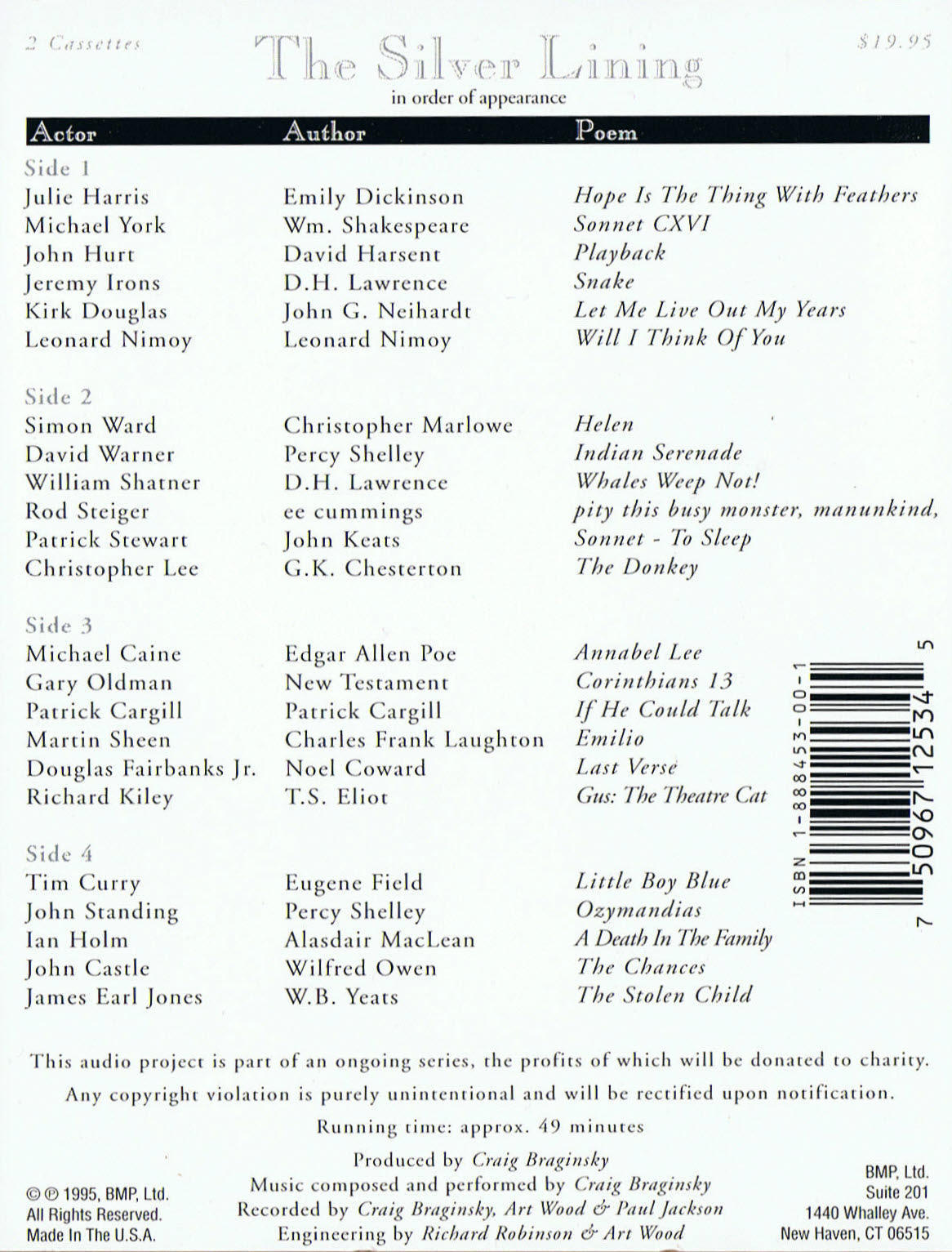 "A Compilation of 23 of the World's Most Distinguished Actors of Stage and Film Read Their Favorite Poems." More here.
"A Compilation of 23 of the World's Most Distinguished Actors of Stage and Film Read Their Favorite Poems." More here.
Symphonic Star Trek (1996)
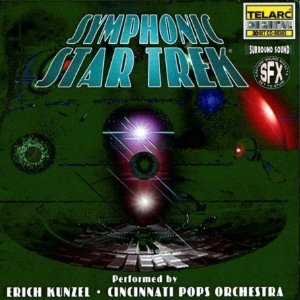
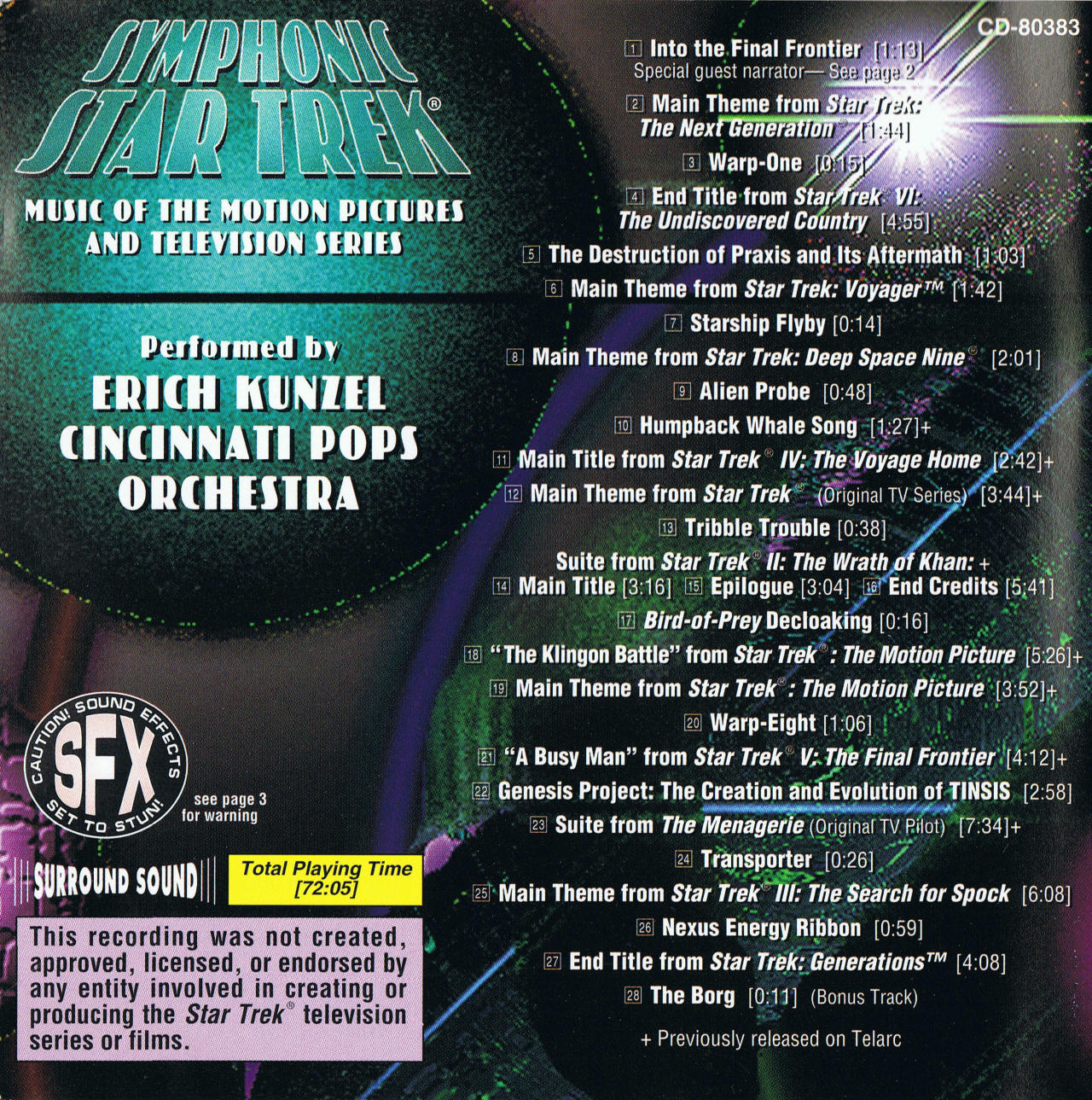 Music from the TV series and the movies, includes sound effects. Introduction by Leonard Nimoy. Listen to an excerpt here.
Music from the TV series and the movies, includes sound effects. Introduction by Leonard Nimoy. Listen to an excerpt here.
Jewish Short Stories from Eastern Europe and Beyond (1995)
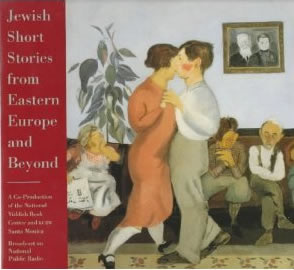 Leonard Nimoy does the introduction and reads In The Mail Coach by I.L. Peretz: "A traveler meets two men who tell similar stories about unhappy Jewish wives. Is it the same woman they are speaking about, or could there be many Jewish women who long for a different life?" (more/close)
Leonard Nimoy does the introduction and reads In The Mail Coach by I.L. Peretz: "A traveler meets two men who tell similar stories about unhappy Jewish wives. Is it the same woman they are speaking about, or could there be many Jewish women who long for a different life?" (more/close)
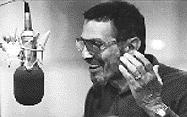 You can listen to the introduction to the series and the story read by him or download it here. (The buttons aren't displayed properly because of broken links to the respective graphics, I think, but they still work, as I was able to download the Real Media files for both just fine.)
You can listen to the introduction to the series and the story read by him or download it here. (The buttons aren't displayed properly because of broken links to the respective graphics, I think, but they still work, as I was able to download the Real Media files for both just fine.)
Leonard Nimoy, the series' host, has said that the seemingly disparate list of authors, literary styles and languages is misleading. "The stories in the series may at first seem rather diverse, if not incongruous," he states in his introduction to the series. "But as you listen, I think you'll agree that all have this in common: whether through humor, tragedy -- or as is more often the case, equal measures of both -- they struggle with a common question: What does it mean -- what can it possibly mean -- to live as a Jew in the modern world?"
In an interview, Mr. Nimoy, a native Yiddish speaker during his Boston boyhood, said that working on the project "felt like a submersion in a nice warm bath."
Source: The New York Times
Jewish Short Stories: A National Public Radio Series
June 3, 1999
When she was 16, KCRW General Manager Ruth Seymour was captivated by her studies with the Yiddish scholar Max Weinreich. "Yiddish is magic," he told her. "It will outwit history."
Seymour took his words to heart. Of late, she has been doing her part to help the mamaloshen survive. In 1995, she and KCRW teamed up with the National Yiddish Book Center to create "Jewish Short Stories," a National Public Radio series read by actors such as Leonard Nimoy and Jeff Goldblum. The program was a peculiar excursion in time-travel: back to the days of golems and rebbes and schlemiels all living together in the shtetl. Yiddish, apparently, worked its magic: At least half the NPR network ran the program, including markets as unlikely as Coos Bay, Ore., and Bozeman, Mont. KCRW sold well more than 1,000 cassette sets of the series.
(...) Once again, celebrities agreed to work for the union base rate of around $11 an hour -- perhaps because of the Yiddish yearnings latent in Ashkenazi DNA. William Shatner, Richard Dreyfuss and Ed Asner signed on, as did directors Arthur Hiller, Jeremy Kagan and Claudia Weil. "Chicago Hope" star Hector Elizondo, of Puerto Rican heritage, said that he was drawn to the series because he has converso blood.
The 18-part series, dubbed "Jewish Stories from the Old World to the New," includes stories and novel excerpts by authors such as Bernard Malamud, E.L. Doctorow, Saul Bellow and Max Apple. It also includes a number of works by women writers: Allegra Goodman's "The Four Questions" humorously explores the conflict between three generations of American Jews; Pearl Abraham's "The Romance Reader" focuses on a restless Chassidic woman; Leslea Newman's "A Letter to Harvey Milk" examines the friendship between an elderly Jewish man and his lesbian creative-writing teacher.
Source: Jewish Journal
Alternate Cover
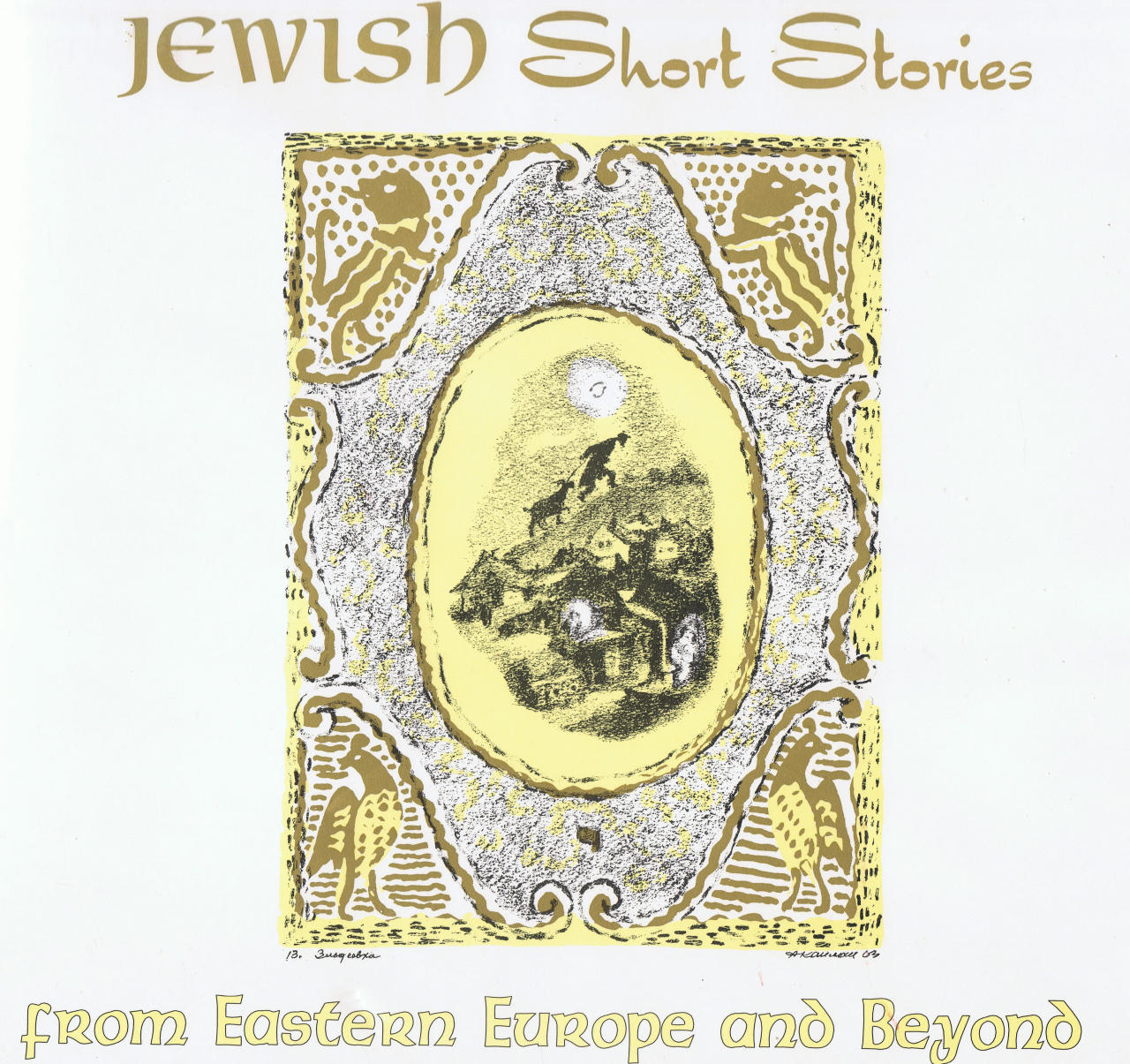 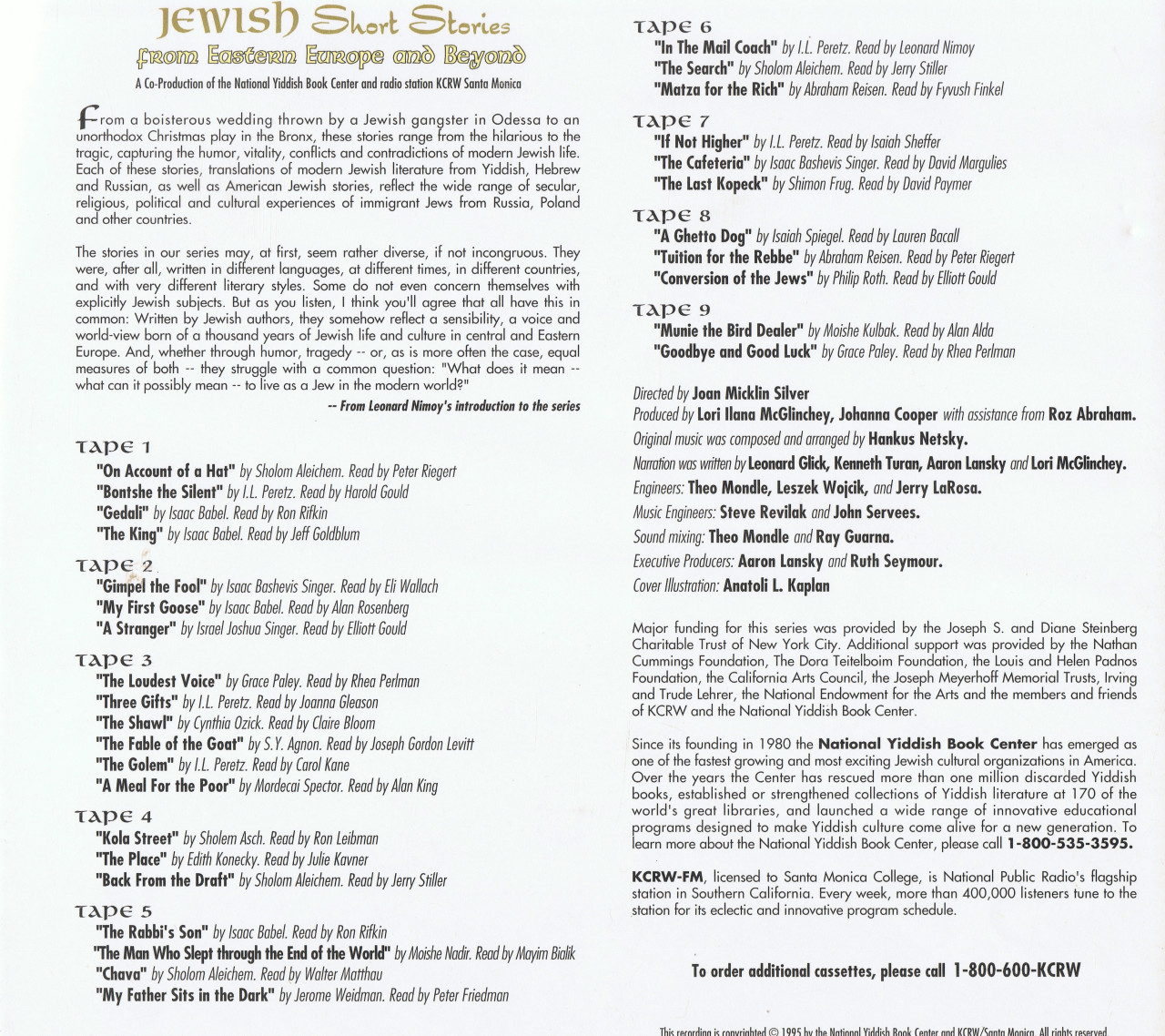 |
I'm Spock (1995)
National Jewish Center for Immunology and Respiratory Medicine (1995)
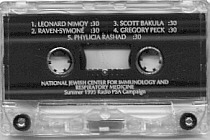 Radio station public service announcements on cassette. Include PSA's from leonard Nimoy, Scott Bakula, Gregory Peck and others. Source: The Leonard Nimoy Album Page. Listen to the PSA by Leonard Nimoy here.
Radio station public service announcements on cassette. Include PSA's from leonard Nimoy, Scott Bakula, Gregory Peck and others. Source: The Leonard Nimoy Album Page. Listen to the PSA by Leonard Nimoy here.
Highly Illogical (1995)
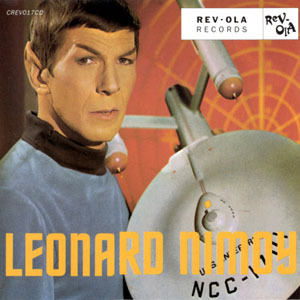
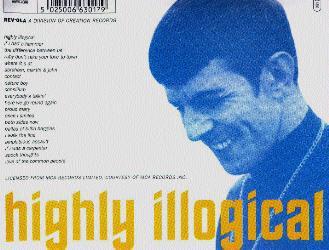 (more/close)
(more/close)
Highly Illogical: Spock's Greatest Hits
In 1993, Rev-ola / Creation Records of London, England released "Highly Illogical" the first Nimoy anthology available on Compact Disk.
There are glaring omissions from the collection, notably all of "Mr. Spock's Music From Outer Space." This is indeed highly illogical, since Revola used the cover art from the orginal Dot recording, leading you to think that this is what you are getting.
On the other hand, if you already have the Varese Sarabande reissue of "Music from Outer Space", "Highly Illogical" makes a great companion collection, since no one really wants to see all of the Dot albums committed to digital anyway.
Some of the funnier tracks from the later Dot albums are also missing, particularly "Billy Don't Play the Banjo Anymore" and "The Hitchhiker" from "The Way I Feel," not to mention "Maiden Wine" from "The Touch of Leonard Nimoy".
A suggestion to future anthologists; skip the uneventful commercial material and concentrate on the songs written by Nimoy and his friends!
Track Listings
1. Highly Illogical
2. If I Had a Hammer
3. Difference Between Us
4. Ruby Don't Take Your Love to Town
5. Where It's At
6. Abraham, Martin & John
7. Contact
8. Nature Boy
9. Consilium
10. Everybody's Talkin'
11. Here We Go Round Again
12. Proud Mary
13. Once I Smiled
14. Both Sides Now
15. Ballad of Bilbo Baggins
16. I Walk the Line
17. Amphibious Assault
18. If I Was a Carpenter
19. Spock Thoughts
20. Love of the Common People
Source: The Leonard Nimoy Album Page
William Shatner & Leonard Nimoy Read Four Science Fiction Classics (1993)
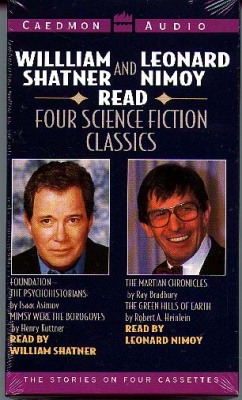 (more/close)
(more/close)
Famous to science fiction fans through the cult-classic television series Star Trek, William Shatner and Leonard Nimoy read four of modern science fiction's most mezmerizing tales and share with listensers their appreciation for imanginative and well-written science fiction.
Leonard Nimoy reads from Ray Bradbury's renowned and chilling The Martian Chronicles, where horror and madness grow as technology and bureaucracy take over peoples' lives. Robert A. Heinlein's The Green Hills of Earth, also read by Nimoy, is the story of a blind singer's adjustment to life on Mars
Source: http://www.reocities.com/Hollywood/Set/1931/four.html
Tracklist
1-A Isaac Asimov – Foundation - The Psychohistorians
1-B Isaac Asimov – Foundation - The Psychohistorians
2-A Ray Bradbury – The Martian Chronicles
2-B Ray Bradbury – The Martian Chronicles
3-A Henry Kuttner – Mimsy Were The Borogoves
3-B Henry Kuttner – Mimsy Were The Borogoves
4-A Robert A. Heinlein – The Green Hills Of Earth
4-B Robert A. Heinlein – The Green Hills Of Earth
Source: Discogs
Star Trek Epics on Audio (1991)
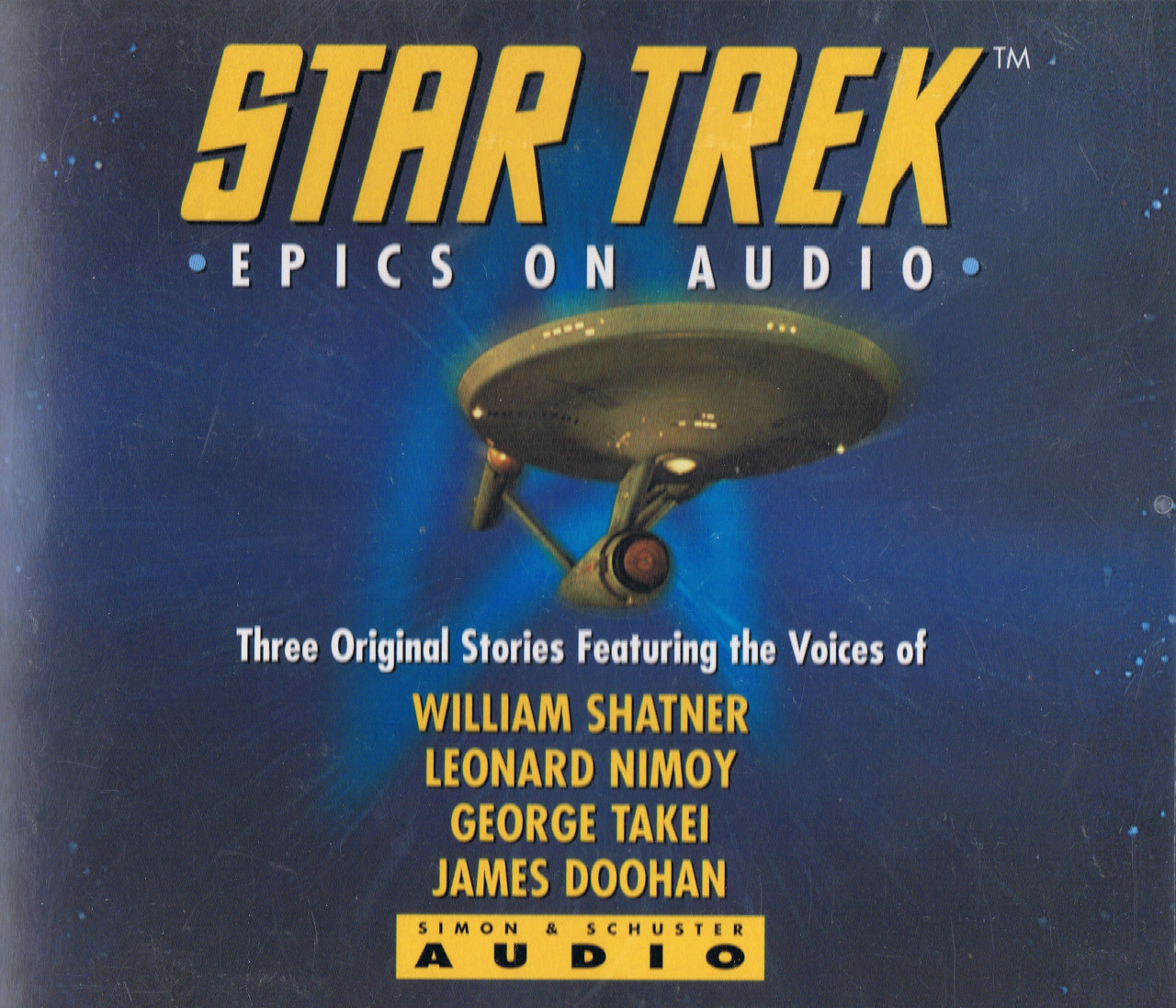 Re-release of formerly recorded audiobooks. The CD set includes Enterprise: The Fist Adventure, Final Frontier, and Strangers fron the Sky.
Re-release of formerly recorded audiobooks. The CD set includes Enterprise: The Fist Adventure, Final Frontier, and Strangers fron the Sky.
Star Trek 25th Anniversary Audio Collection Audioworks (1991)
Star Trek 25th Anniversary Audio Collection Audioworks; abridged edition edition (September 1, 1991)
The three episodes contained on this 25th anniversary (released in 1991) audio edition range from weak to good.
FIRST ADVENTURE is a bit of a mess, a forced story with some characterization faults. I'd rate it a D.
FINAL FRONTIER (Romulans) is better, but it still suffers at a few points. I'd give it a C.
STRANGERS FROM THE SKY (Vulcans) is the best of the bunch, my rating is a B.
The narrations by Takei, Doohan, and Nimoy are admirably performed under the circumstances.
Shatner's short bonus anecdotes are welcome and interesting.
http://www.amazon.com/Star-Anniversary-Audio-Collection-compact/dp/0671746022
The Entropy Effect, Simon & Schuster Audioworks (August 15, 1988)
Time for Yesterday Audioworks (August 15, 1988)
Yesterday's Son Audioworks (August 15, 1988)
Web of the Romulans Audioworks (March 15, 1988)
Whales Alive (1987)
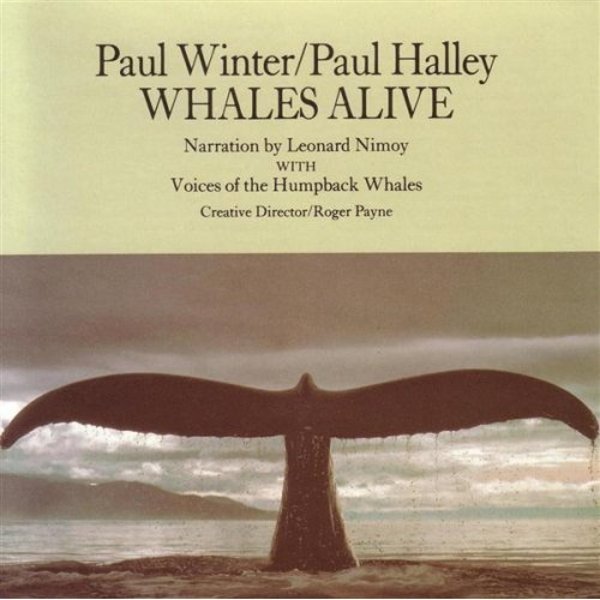 "Whales Alive is a 1987 album of improvisational duets and sometimes trios between Paul Winter, Paul Halley, and recordings of singing humpback whales. Winter and Halley also collaborate with Leonard Nimoy, who reads poems and prose from various writers, including D.H. Lawrence and Roger Payne." Source: Wikipedia (more/close)
"Whales Alive is a 1987 album of improvisational duets and sometimes trios between Paul Winter, Paul Halley, and recordings of singing humpback whales. Winter and Halley also collaborate with Leonard Nimoy, who reads poems and prose from various writers, including D.H. Lawrence and Roger Payne." Source: Wikipedia (more/close)
Whales Alive
A celebration of whales in poetry, prose and music, with original compositions by sax and pipe organ, based on melodies by humpback whales themselves.
Improvising in the Cathedral of St. John the Divine in response to recordings of the whale songs, Paul Winter and Paul Halley extend the whale melodies in a way similar perhaps to the manner in which the whales themselves gradually change and grow their long, complex songs. Readings from the prose and poetry of D.H.Lawrence, Herman Melville, Gary Snyder and Roger Payne, Leonard Nimoy gives voice with the same awe for whales which inspired the plot for the film STAR TREK™ IV. The whole is a celebration of whales in poetry, prose and music.
"A haunting record that you won't forget and you'll play over and over again." (EXPRESS NEWS)
"WHALES ALIVE actually creates an astounding integration of musical voices, which serves to emphasize the raw, primal and intensely musical quality of the whales as they sing. These pristine, unadulterated voices of nature, subtly shaded by human instruments, have an eerie, haunting, irresistible quality." (DALLAS TIMES HERALD)
credits
released 15 September 1987
Paul Winter and Paul Halley, with narration by Leonard Nimoy
Produced by Roger Payne and Paul Winter
Source: Paul Winter
Symphony of Whales
Whales came into Paul’s life in 1968, when he attended a lecture on whale songs by Dr. Roger Payne at Rockefeller University in New York City. Roger and Scott McVay had discovered, the year before, that humpbacks produce sounds in intricate patterns that fit the definition of “songs.” These change over time and represent a cultural tradition passed orally from one whale to the next. Paul was thrilled by the soulful beauty of these humpback whale voices in much the same way as when he had first heard jazz saxophonists like Charlie Parker. Listening to the long, complex songs the whales repeat, he was amazed by their musical intelligence, and shocked to learn that these extraordinary creatures were rapidly being hunted to extinction. They opened the door to the whole symphony of nature and changed the direction of Paul’s musical life.
Another milestone was hearing Roger Payne’s 1970 album, Songs of the Humpback Whale, which popularized the whale songs, and was perhaps the greatest single contribution to awakening humanity to whales. The grandfather of all natural sound recordings, and a bestseller, it touched the hearts of millions of people throughout the world, awakening awareness of whales, and contributing more, perhaps, towards saving whales and sea mammals than all other efforts put together. (Paul re-released it on his Living Music label in 1990.)
In the 1970s, Paul became involved in the movement to bring awareness of whales and their extraordinary music to the world. In the Fall of 1976 Governor Jerry Brown declared “Whale Day” in California. He convened a three day whale conference in Sacramento, bringing in biologists like John Lily; filmmakers; environmentalists; poets, like Gary Snyder; musicians such as Joni Mitchell and the Consort; and fans of the whales. During the early 1970s, as whale consciousness emerged in our culture, Japan began to come under widespread criticism for its continued whaling operations. There were protest campaigns with bumper stickers such as “Boycott Japan.” From the Sacramento whale conference came the idea that rather than boycott Japan, efforts should be made to communicate with Japanese environmentalists and share with them the growing body of information about whales and why they should be protected.
This resulted the next April in a large contingent of biologists and musicians (including the Consort and Mimi Fariña, Jackson Brown, and a fusion band, Stuff, featuring Steve Gadd), along with Governor Brown, going to Tokyo for a week of performances in a dome there, titled “Japan Celebrates the Whale and Dolphin.” It was reportedly the first environmental event ever held in Japan.
Paul went to Japan several times with the “Save the Whale” campaign; played benefits for Greenpeace and other organizations; and led music-making and whale-watching workshops on Cape Cod and in Baja California.
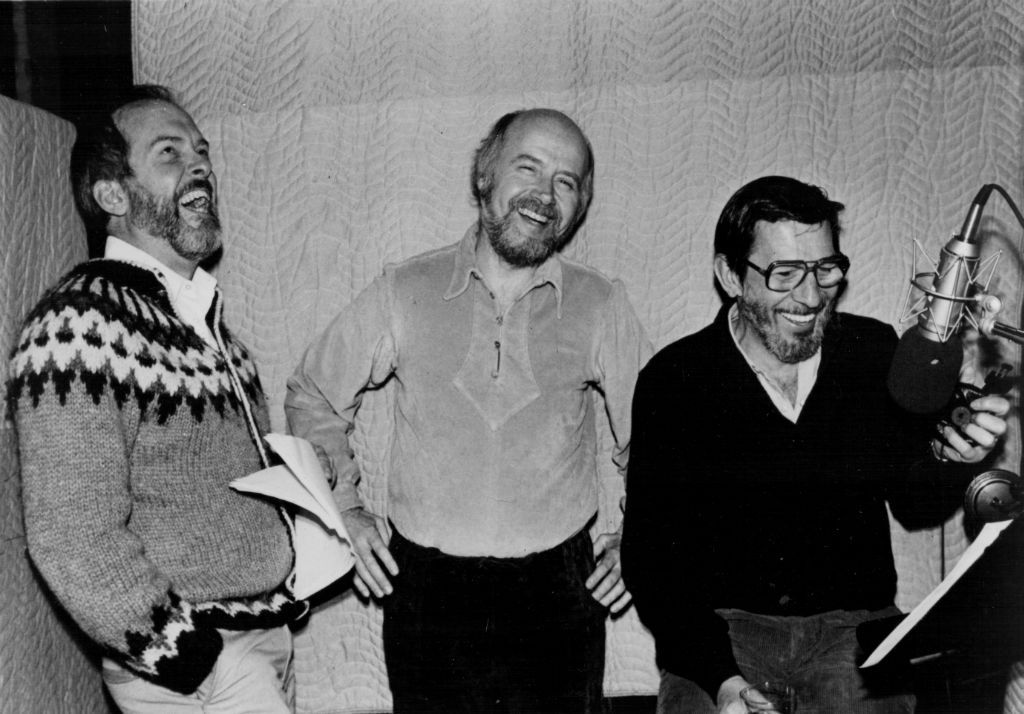
(L to R) Roger Payne, Paul Winter, and Leonard Nimoy
Whales Alive! was another collaboration with Roger and also actor Leonard Nimoy, resulting in a groundbreaking album that celebrates the history of whales and their role in the lives of humans. It realized a long-standing dream shared by Roger Payne and Paul to create an entire album of music based on melodies by whales. Readings of prose and poetry about whales are interspersed with music improvised in response to recordings of the whale voices, extending the whale melodies in a way similar, perhaps, to how the whales themselves gradually change and grow their long, complex songs.
In 1990, Paul convinced Roger, a representative to the International Whaling Commission, and a long-time friend, to come to Japan to various whaling cities, including Shoji and Ogasawara. Instead of opposing, on the Whaling Commission, Japan’s stance on hunting whales, Roger joined Paul on a joint tour with music, presenting a program showing how whale watching could be a viable business alternative to whale-killing.
Source: Paul Winter
Paul Winter / Paul Halley co-produced by Roger Payne
Whales Alive!
1987 Grammy Nominee
Original compositions by sax and pipe organ, based on melodies by the humpback whales themselves. Leonard Nimoy narrates from "Moby Dick" and the poetry of D.H. Lawrence, Gary Snyder and Roger Payne, giving voice with the same deep feeling for whales that inspired his story for the film "Star Trek IV".
"WHALES ALIVE! looks like a novelty record, and so there's a disquieting surprise in the discovery not only of its intelligence and seriousness, but also of its remarkable musical power.... Paul Winter and Paul Halley have thoughtfully blended their own music...with recordings of the voices of whales.... WHALES ALIVE! actually creates an astounding integration of musical voices, which serves to emphasize the raw, primal and intensely musical quality of the whales as they sing. These pristine, unadulterated voices of nature, subtly shaded by human instruments, have an eerie, haunting, irresistible quality." - Dallas Times Herald
"Humpback whales have been on this planet for millions of years, and for most of that time they have probably been singing. WHALES ALIVE! celebrates this history and the new relationship between humans and whales."
"The changing songs of humpbacks represent a cultural tradition which is passed orally from one whale to the next. That humpbacks have a culture of their own, carried along by oral transmission, is a message that has been amplified in a curious way. In the 1970s, when the Voyager I and II spacecraft were being prepared for their long journeys past Saturn, Jupiter, Uranus, and on out of the solar system - a voyage expected to last 1.2 billion years - recordings of the whales songs were placed on board along with the music of Bach and other human greetings, on the off chance that some other spacefaring civilization might find this 'bottle cast into the cosmic ocean'."
"It has been only thirty years since the discovery that whales sing. In this short time, the songs of whales, long confined to within the vaults of the sea, have burst through its surface, flowed over the land, conquered the hearts of their age-old enemy, humanity, and are now bound on a 1.2 billion year journey that will spread them throughout the galaxy." - Roger Payne
The whales came into my life in 1968, when I attended a lecture on whale songs by Dr. Roger Payne at Rockefeller University in New York City. I was thrilled by the soulful beauty of these humpback whale voices, in much the same way as I'd been when I first heard jazz saxophonists like Charlie Parker. Listening to the long, complex songs the whales repeat, I was amazed by their musical intelligence and shocked to learn that these extraordinary creatures were rapidly being hunted to extinction.
Few experiences have had a deeper effect on my life, for this night led me not only to the whales, but opened my ears to the entire symphony of nature. In the years following I sought out whales wherever I could in coastal areas around North America. Occasionally I had the chance to be near them in small rafts and play my saxophone while listening through underwater microphones to their singing. Once you have been close to whales like this, you are, as Leonard Nimoy says in this album, 'changed forever'.
In the course of my growing friendship with Roger Payne, I became familiar with a part of his vast library of whale recordings. The music they inspired in me became part of my repertoire and the humpback whale soon was a charter member of the Paul Winter Consort. During some of our whale-consorting expeditions to places like Baja California, British Columbia, and Newfoundland, we encountered other 'musicians'of the sea, such as sea lions, dolphins, seals, and orcas. In 1980 we produced CALLINGS, a double album of music interweaving the voices of thirteen species of sea mammals. Throughout these two decades, Roger Payne has continued to work tirelessly on behalf of whales, spending time every year in remote areas studying the rare right whales; doing research on bowhead whales in the Beaufort Sea, gray whales off the California coast, blue whales near Sri Lanka, and humpbacks in Hawaii; and serving as a representative to the International Whaling Commission. His popularization of whale singing, through his 1970 album, SONGS OF THE HUMPBACK WHALE, was perhaps the greatest single contribution to awakening humanity to whales.
When Leonard Nimoy began work on 'Star Trek: The Voyage Home' , he contacted Roger for the whale recordings used in the film. When the film was released, Paramount Pictures gave a benefit premiere in Boston for Roger's Long Term Institute, to which he invited me. I loved the movie's reverence for the whales and their intelligence, and the fact that in this story whales save the earth. Many of us have long felt that the whales may do just that; they have become a powerful symbol reconnecting human consciousness to the wisdom of the wild world. The night of the premiere, awash in enthusiasm, Roger and I talked until dawn about our long-shared dream of creating an entire album of music based on whale songs. WHALES ALIVE! is the result.
I could not have asked for greater collaborators in the making of this music. Roger Payne is a rare combination of scientist and musician; he is a fine cellist who has played chamber music all his life. His sound-visions played a great part in the creation of our music. Paul Halley, keyboardist with the Consort since 1980 has a harmonic sense as noble as the whales themselves. Leonard Nimoy's concern for the whales is genuine, and his passionate readings inspired several of the pieces. And the whales: they are such inventive melodists, always taking us in new and unexpected musical directions. All but one of the pieces on the album are from melodies "composed" by the whales themselves.
The album was recorded in a series of all-night January sessions in New York's Cathedral of St. John the Divine. Roger and I had gathered themes from countless hours of whale recordings; he would sit up in the organ loft and play them from a tape recorder to Paul Halley, who improvised alluring organ harmonies to accompany the whale melodies.
At my playing post far down the Cathedral nave, listening to the organ with one ear and to the whale through a headphone on the other, I followed Paul's harmonies with my sax and together we extended the whale melodies through improvising in a way similar perhaps to how the whales themselves gradually change and grow their long songs. The experience has been one of the most enjoyable of my musical life.
Whale songs, in this short while since they have come into our culture, have touched the hearts of a human audience so large that whale-watching is now a bigger business world-wide than whale-killing. We have come to value their living beauty more than their dead bodies.
Like the pied piper, whales are luring us to end our 'long loneliness' within the world of nature. I find in this great optimism: for if we can overcome our age-old fears of these largest of creatures, then surely we can overcome our fears of smaller ones, including other humans.
WHALES ALIVE is a celebration of this optimism, and our song of gratitude to whales for the beauty and wisdom they have brought into our lives.
1. Whales Weep Not! (Overture)
2. Dawnwatch
3. George and Gracie
4. Turning
5. Concerto for Whale and Organ
6. Humphrey's Bules
7. Queequeg and I
The Water Is Wide
8. Ocean Dream
9. The Voyage Home (Finale)
Source: The Leonard Nimoy Album Page
Prevent Forest Fires (1985)
 PSA by the Forest Service, USDA, State Forresters and the Ad Council about preventing forest fires. Narrated by Leonard Nimoy, making use of the Spock character.
PSA by the Forest Service, USDA, State Forresters and the Ad Council about preventing forest fires. Narrated by Leonard Nimoy, making use of the Spock character.
Smokey`s New Ads Mean It`s No More Mr. Nice Bear
June 11, 1985|By Lorenzo Benet , Los Angeles Daily News
Gone are the days when Smokey Bear was a friendly, laid-back ranger who could only nod in disgust at the charred remains of a forest devastated by fire.
Borrowing the theme from the World War I advertising campaign ``Uncle Sam Wants You for the U.S. Army,`` the Los Angeles-based advertising firm of Foote, Cone & Belding created a new poster of Smokey getting tough with would- be arsonists and careless campers.
Armed with a shovel in one paw, the bear, outfitted in his traditional ranger hat and blue jeans, points toward the viewer and seems to be repeating the logo ``ONLY YOU`` (as in, ``Only you can prevent forest fires``), which appears at the bottom of the poster.
In March, the poster was tacked to the walls of school buildings and fire stations and posted in state and federal parks. But that`s not the only medium the U.S. Forest Service is using to reach audiences. That same month, it also launched a nationwide television public service ad campaign that shows a middle-class father being arrested and jailed for accidentally starting a forest fire. In the 30- to 60-second spots, the man portraying the smartly clad father says, ``I don`t understand this; I didn`t mean to start a forest fire,`` to which actor Leonard Nimoy is heard to say at the ad`s end, ``Whether it`s accidental or not, one way or another you`ll pay.``
For a decade, the forest service has attacked the problem with a low-key approach -- including posters showing a lovable Smokey cradling small forest creatures.
Why the new hard-line tactic?
Officials hope the new TV ad campaign will reach arsonists and others who may not be aware of the little-known fact that forest fires of all origins are punishable by imprisonment, in addition to fines and restitution payments.
Source: Sun Sentinel
The Mysterious Golem (1982)
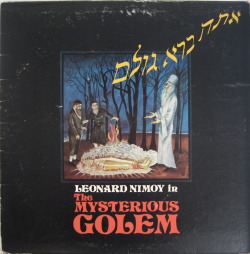
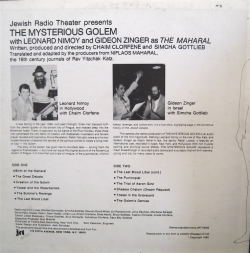 Synopsis from the backcover of the record: "It was Spring in the year 1589. Just past midnight, three men stepped forth from the Jewish quarter of the ancient city of Prague, and headed deep into the Bohemian forest. There, in seclusion by the banks of the River Moldau, these three men penetrated the very fabric of creation with
Synopsis from the backcover of the record: "It was Spring in the year 1589. Just past midnight, three men stepped forth from the Jewish quarter of the ancient city of Prague, and headed deep into the Bohemian forest. There, in seclusion by the banks of the River Moldau, these three men penetrated the very fabric of creation with 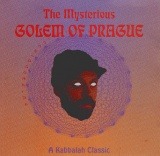 Kabbalistic incantation and fervent prayer. Guided and inspired by Divine Revelation, Rabbi Yehuda Loewe and his two trusted disciples unleashed the secrets of the spiritual worlds to create a living man of clay - the Golem." It can be ordered as a re-release on CD here. An excerpt is available on the page.
Kabbalistic incantation and fervent prayer. Guided and inspired by Divine Revelation, Rabbi Yehuda Loewe and his two trusted disciples unleashed the secrets of the spiritual worlds to create a living man of clay - the Golem." It can be ordered as a re-release on CD here. An excerpt is available on the page.
Mutual Radio Theater (1980)
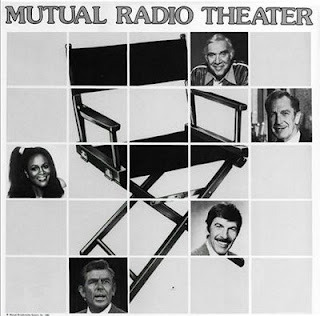 "First show: Mar 3, 1980 Original shows: 103 Last show: Dec 10, 1980
"First show: Mar 3, 1980 Original shows: 103 Last show: Dec 10, 1980
Number of programs aired including new and repeats: 210.
Hosts: Lorne Greene, Andy Griffith, Vincent Price, Cicely Tyson, Leonard Nimoy" (more/close)
First show: Mar 3, 1980 Original shows: 103 Last show: Dec 10, 1980
Number of programs aired including new and repeats: 210
Hosts: Lorne Greene, Andy Griffith, Vincent Price, Cicely Tyson, Leonard Nimoy
In December 1979 the Mutual Broadcasting System acquired the Sears Radio Theater renaming it, the MUTUAL Radio Theater. It retained the same format as before with the same theme for different nights of the week. Lorne Greene remained host for Monday's Western night, Andy Griffith handled Tuesday's Comedy, Vincent Price still was host for Mystery on Wednesdays, Cicely Tyson did Love on Thursday, while Leonard Nimoy was now the Friday night Adventure host. As before the series aired week nights, Monday through Friday.
The Mutual Radio Theater debuted Mar 3, 1980 and was to run for 13 weeks on almost 300 stations. The shows were then to be repeated over the summer and fall. It proved to be fairly successful and another 8 weeks of original programs were added; this was followed by another 8 weeks of repeats. The series was broadcast in stereo, making it the only commercial radio network drama program in the nation to use this technology at the time.
Great writers were employed for this series including Arch Oboler and Norman Corwin. Good choices were made when it came to cast members. Old familiar voices and names included Janet Waldo, John Dehner, Vic Perrin, Mary Jane Croft, Hans Conried, Marvin Miller, Parley Baer, Elliot Lewis, Jeff Corey, Virginia Gregg, Lesley Woods, Robert Rockwell and Lurene Tuttle. Then from movies and TV - Eve Arden, Keith Andes, Harriet Nelson, Aan Young, Tom Bosley and Marian Ross, Lloyd Bochner, Rick Jason, Frank Campanella, Toni Tennille, Arthur Hill, Dan O'Herlihy, Jesse White and Frank Nelson.
A curious note: Many collectors and vendors list a total of 104 broadcasts. Apparently what was done by them was to count a repeat of "The Ship", first broadcast on March 7, 1980 as another show when it was aired again during the first 13 week cycle (May 23, 1980).
The download links for the above website don't work anymore. Some shows can be downloaded here.
This page (MUTUAL RADIO THEATER compiled by Dick Judge Up-dated Dec 3, 2005), gives a complete list of shows and airdates.
A review and scans of the acompanying notes can be found at Booksteve's Library. From that we know Leonard Nimoy hosted "A Trip to Casablanca."
Like most of the latter-day attempts, MRT was an anthology series but this five day a week series offered a different genre and a different celebrity host for every night of the week.
Monday was Western night hosted by BONANZA’s Lorne Greene (himself a veteran of Canadian radio). Tuesday was Comedy night presented by Andy Griffith. On Wednesday, Vincent Price—a radio man from way back—offered Mystery. Thursday featured Cicely Tyson with Romance and Friday perhaps incongruously offered Leonard (I AM NOT SPOCK) Nimoy with Adventure night.
An immediate inherent fault in this format was the fact that if you liked mysteries and adventures, you would only listen on Wednesdays and Fridays. If you only wanted a few laughs, you’d only tune in on Tuesday. Since listening to radio in the evenings was hardly a regular habit for most folks by 1980, more than likely you wouldn’t even remember from week to week.
It might have helped if the series had gotten listings, reviews or other publicity in newspapers but quite frankly if the MUTUAL RADIO THEATER even played in the Cincinnati market I was never aware of it.
Source: Booksteve's Library
Also hosted by Leonard Nimoy was the episode "The Ship," which is available at Old Time Radio Fans. The Digital Daily Too lists him as introducing the story "A Decent Christian Woman." You can buy CD sets at Buy it at Nostalgia Merchant or Radio Archives.
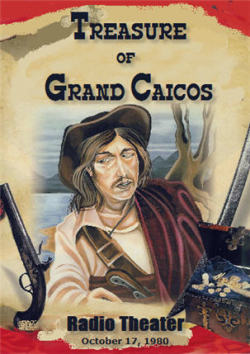 He also hosted the "Treasure Of Grand Caicos." It aired October 17, 1980 staring Tom Brown and Vic Perrin.
He also hosted the "Treasure Of Grand Caicos." It aired October 17, 1980 staring Tom Brown and Vic Perrin.
The Show can be downloaded here.
Science Fiction Soundbook (1977)
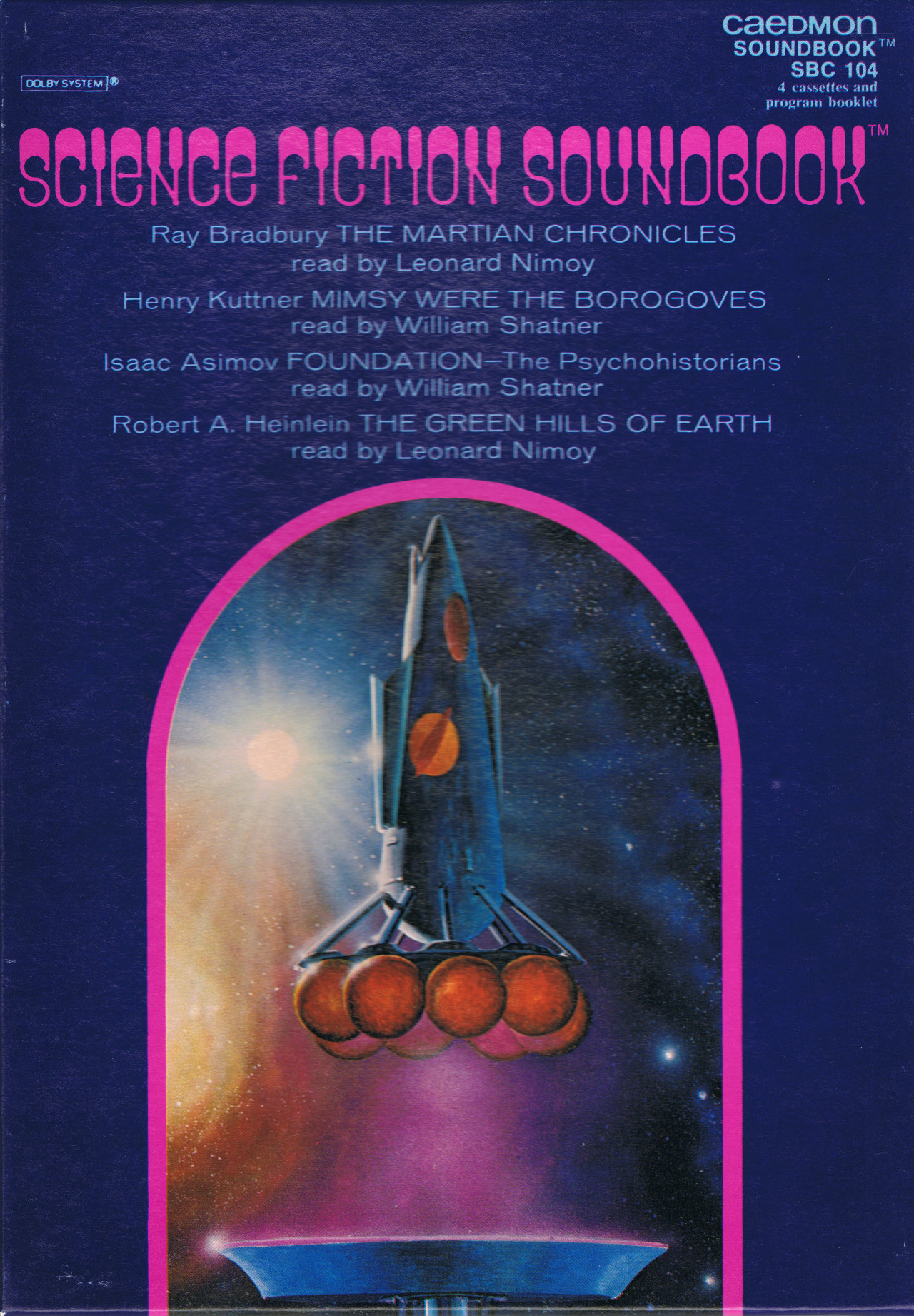 "Later released as William Shatner and Leonard Nimoy
"Later released as William Shatner and Leonard Nimoy
-Read- Four Science Fiction Classics." -chaseclub.com
Science Fiction Soundbook
By Ray Bradbury, Isaac Asimov, and Robert A. Heinlein
Read By Leonard Nimoy and William Shatner
4 hours – 4 Cassettes [UNABRIDGED]
I found Leonard Nimoy’s readings to be excellent. In Bradbury’s “Usher II”, he delivers a passionate speech about the evils of book burning with perfection. In “Gentlemen, Be Seated” and “The Green Hills of Earth” he portrays working class spacemen with complete success.
William Shatner, though, was disappointing. I’ve heard him read some Star Trek titles, and felt his delivery was pretty good, but here, on both cassettes, he reads as if he needs to be across town in fifteen minutes. He zips through the text, sometimes fast enough to affect my comprehension.
The stories are all bona-fide 5-star classics:
“There Will Come Soft Rains” by Ray Bradbury, read by Leonard Nimoy
This famous story is about a house. That’s it, just a house. An automatic, programmed house that keeps running and running… but where are its inhabitants? Bradbury manages to tell a very human tale without any actual people.
“Usher II” by Ray Bradbury, read by Leonard Nimoy
A fantastic story, passionately read, about a man who builds Poe’s House of Usher on Mars. Because of the social climate on Earth, it would be illegal to build such a fantastic structure, because stories of fantasy are simply no longer allowed. If you agree with that policy, this fellow would be happy to show you around, and he does get that opportunity. As I mentioned earlier, a highlight is a speech on censorship that was an obvious precursor to Bradbury’s Fahrenheit 451.
“The Psychohistorians” by Isaac Asimov, read by William Shatner
This is the first novelette in the first book of Asimov’s Foundation trilogy. In it, you meet Hari Seldon and Gaal Dornick in an introduction to some of the key elements of the Foundation story, including the Empire in decline and the mathematics of psychohistory. However, I did have difficulty get into Shatner’s narration.
“The Green Hills of Earth” by Robert A. Heinlein, read by Leonard Nimoy
Rhysling is a Spacer who lost his eyesight in a reactor pile accident. Now, he’s a famous bard, and this is his story. The story is an excellent portrayal of what spaceflight might be like from the working stiff’s point of view, once flight becomes common. At least from the perspective of a science fiction writer in 1948. No NASA engineers here.
“Gentlemen, Be Seated” by Robert A. Heinlein, read by Leonard Nimoy
This story is similar to “Green Hills” in that the characters are working class spacemen. One agrees to take a reporter through some new buildings on the moon (yes, he does get overtime pay for it), but an accident occurs during the tour. Another story from the late 1940′s, which is the part of Heinlein’s long career that I enjoy most.
“Mimsy Were the Borogroves” by Henry Kuttner, read by William Shatner
This story fared better under Shatner’s cadence than did “The Psychohistorians”. I was captured by it within 5 minutes or so of concentrated listening, and Kuttner’s story held my attention even when Shatner didn’t. The story involves some toys that were sent back in time by a far-future scientist with too much time on his hands. The toys are found by some kids, who play with them, and are changed by them. The story plays with the ideas of how people think – how kids think, how adults think, and how it could possibly be different. I found it a well-written and entertaining exploration of these ideas. Great science fiction.
Source: SFFaudio
|
| A | The Veldt | 29:15 | ||
| B | Marionettes. Inc., |
- Directed By – Ward Botsford
- Engineer – Daniel A. Wolfert
- Illustration [Cover Illustration] – Diane Dillon (2), Leo Dillon
- Liner Notes – Sandra Ley
- Narrator [Read By] – Leonard Nimoy
- Written-By – Ray Bradbury
Leonard Nimoy reads Ray Bradbury's "The Veldt"
A1 |
There Will Come Soft Rains |
14:55 |
||
A2 |
Usher II - Beginning |
7:55 |
||
B1 |
Usher II - Conclusion |
26:35 |
-
Directed By – Ward Botsford
-
Engineer – Daniel A. Wolfert
-
Illustration [Cover Illustration] – Diane Dillon (2), Leo Dillon
-
Liner Notes – Sandra Rey
-
Narrator [Read By] – Leonard Nimoy
- Written-By – Ray Bradbury
Leonard Nimoy reads Ray Bradbury's "There Will Come Soft Rains" from "The Martian Chronicles"
Outer Space/Inner Mind (1974)
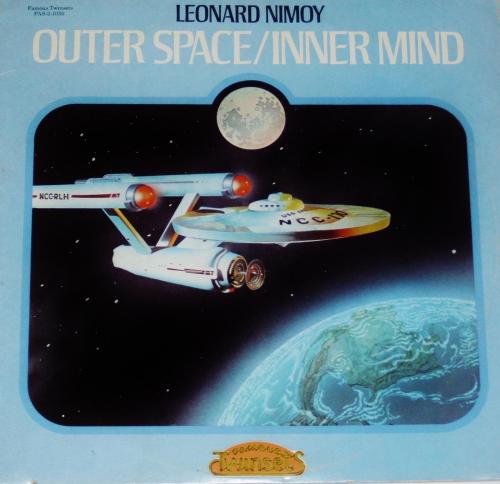
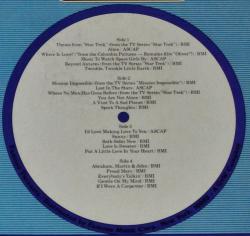 (more/close)
(more/close)
Paramount Records (which used to be Dot), has re-released several of Leonard Nimoy's previous recordings under an attractive two-record album enitled OUTER SPACE/INNER MIND. There are no new cuts on the album, however some of his best titles are included, and it is wonderful that they have re-released them in the form of a new album in order to give some of the newer Leonard Nimoy fans the opportunity to purchase records which were and still are very difficult to locate due to their popularity! Check your local record stores or department stores for further details!
(Source: LNAF Newsletter June 1974)
Beam me up, Scotty, Dot has sold my master tapes to the Italians!
"Outer Space, Inner Mind" was released as part of the Paramount "Famous Twinset" series in 1974. A feeble attempt at a greatest hits package, it is essentially a re-issue of "Mr. Spock's Music from Outer Space" together with some of Nimoy's more infamous covers ("Proud Mary", "Abraham, Martin and John", "If I were a Carpenter" etc).
Poor old Leonard now ends up in a re-issue series featuring artists such as the Mills Brothers and the Andrews Sisters. You almost feel pity.
Unfortunately, the sound quality isn't very good, and the records have very low gain compared to the earlier DOT releases. The packaging is a shameless Star Trek rip-off, complete with cheesy oil painting of the Enterprise. The usual Star-trek copyright info is completely missing, suggesting that by 1974, no-one really cared anymore.
Mention is made of the fact that Leonard Nimoy is still singing... for the residents of a drug rehabilitation clinic!
Leonard Nimoy lp vinyl "Outer Space/Inner Mind (Theme From Star Trek/Alien/Where is Love?/Music To Watch Space Girls by/Beyond Antares/Twinkle, Twinkle Little Earth/Mission Impossible/Lost In the Stars/Where No Man Has Gone Before/You Are Not Alone/A Visit To a Sad Planet/Spock Thoughts/I'd Love Making Love To You/Sunny/Both Sides Now/Love is Sweeter/Put a Little Love In Your Heart/Abraham, Martin & John/Proud Mary/Everybody's Talkin'/Gentle On My Mind/If I Were a Carpenter)", Famous Twinsets PAS-2-1030/gatefold/2 lp's/dj labels/sm/'74
Source: The Leonard Nimoy Album Page
Get Off (1973)
 (more/close)
(more/close)
Performer(s): Ringo Starr of The Beatles, Phil Ochs, Ravi Shankar, William Shatner, Leonard Nimoy and Nichelle Nichols of Star Trek, Loudon Wainright III, Bob Weir of The Grateful Dead, Wolfman Jack, Stevie Wonder, Frank Zappa, Jim Dandy of Black Oak Arkansas, Robert Lamm of Chicago, Alice Cooper, Judy Collins, Jim Croce, Pat Simmons and Tiran Porter of the Doobie Brothers, Dr. John, Glenn Frey of the Eagles, Mark Farner of Grand Funk Railroad, Burton Cummings of Guess Who, B.B. King, Al Kppoer, Loggins & Messina, John McLaughlin, and several others .
Pressed by MCA for National Association of Progressive Radio Announcers STEREO Promo-Only LP .
Comments: Promo-Only 1973 LP utilizing celebrity spots. From the inside gatefold liner: "Music is a life force. These celebrities and the members of the National Associtation of Progressive Radio Announcers proudly offer this collection fo Public Awareness Announcements for radio, in the hope that someone, somewhere, will stop and think." Several artists sing original short tunes, including Sha Na Na, Stevie Wonder and Phil Ochs, Star Trek crew is in character, Nimoy: ‘as a Vulcan, I find the use of hard drugs highly illogical.’
Source: The Leonard Nimoy Album Page
Leonard Nimoy Space Odyssey (1972)
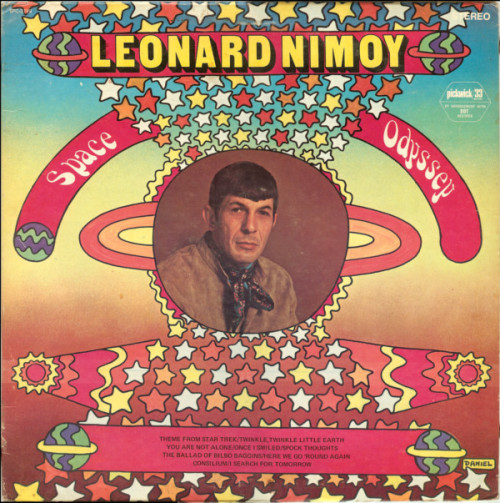
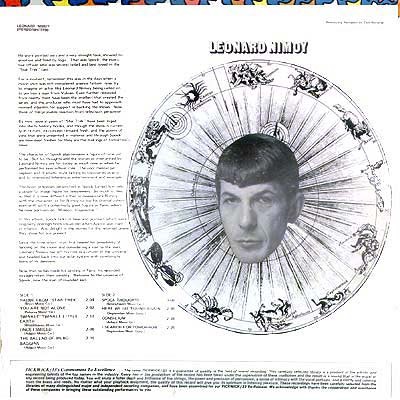 (more/close)
(more/close)
Space Odyssey
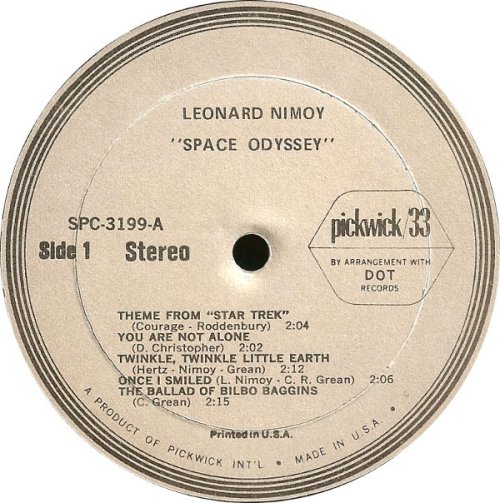
Released 1972 by Pickwick Records (SPC-3199) and (with a different cover and simply titled "Leonard Nimoy") by Sears (SPS-491)
Side 1
Theme from Star Trek (Alexander Courage / Gene Roddenberry)
You Are Not Alone (Don Christopher)
Twinkle, Twinkle, Little Earth (Charles R. Grean / Fred Hertz / Leonard Nimoy)
Once I Smiled (Charles R. Grean / Leonard Nimoy)
The Ballad Of Bilbo Baggins (Charles R. Grean)
Side 2
Spock Thoughts (Charles R. Grean)
Here We Go 'Round Again (P. Evans / P. Parnes)
Consilium (Leonard Nimoy / Charles R. Grean)
I Search For Tomorrow (P. Evans / P. Parnes)
Source: Wikipedia
Nine Tracks from previously recorded DOT Albums
The Pickwick folks who bought the masters didn't even bother proof-reading the jacket notes:
He wore pointed ears and a very straight face, showed no emotion and lived by logic. That was Spock, the executive officer who was second billed and best loved in the "Star Trek" cast.
For a moment, remember this was in the days when a moon shot was still considered science fiction, now try to imagine an actor like Leonard Nimoy being called on to portray a man from Vulcan. Even further removed from reality must have been the intellect that created the series; and the producer who must have had to approach monied interests for support in backing the shows. Now think of the probable reaction from television personnel.
By now, several years of "Star Trek" have been loged (sic) into the tv history books, and though the show is currently in re-runs, its concept remains fresh, and the points of view that were presented in material and through Spock are now even fresher for they are the makings of tomorrow's news.
The character of Spock also remains a figure of time yet to be. But his thoughts and the stories as interpreted by Leonard Nimoy are for today as much now as when he performed his exec-officer role. The cool mental perception and dramatic style belong to visionaries as grist and to interested listeners as entertainment and example.
The brain processes personified in Spock turned him into a powerful image-figure for televiewers. So much is this so that it is now difficult either to disassociate Nimoy with the character, or for Nimoy to top his dramatization even with such a potentially great fugure (sic) as Paris, whom he now portrays on "Mission: Impossible."
In this album, Spock talks in tales and pointers which were originally precognitions visualized when Apollo was itself in infancy. And delight in the stories for the retained power they show for our present.
Since the time when man first neared his possibility of landing on the moon and considering a visit to the stars, Leonard Nimoy has left his role as a citizen of the universe and headed back into our solar system with comtemplations of its denizens.
Now, that he has made his landing in Paris, his recorded voyages retain their validity. Welcome to the universe of Spock, now the man of rounded ears.
Source: The Leonard Nimoy Album Page
Boy Scouts of America Radio PSA (1970's)
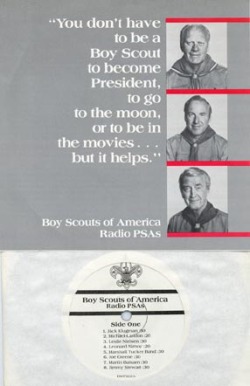 (more/close)
(more/close)
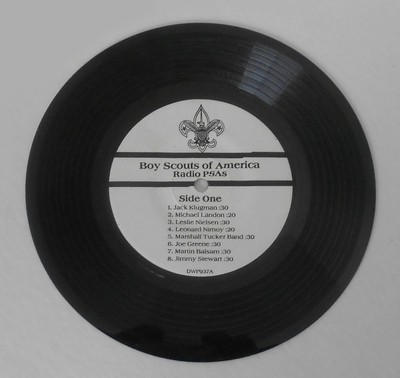 7" 33 1/3 RPM record. 16 thirty second American Radio Spots with Ricardo Montalban, Elliot Gould, Chuck Connors, Patrick Duffy, Tom T. Hall, James Brown, Nipsey Russell, Pres. Gerald Ford, Jack Klugman, Michael Landon, Leslie Nielsen, Leonard Nimoy, Marshall Tucker Band, Joe Greene, Martin Balsam, Jimmy Stewart. Album includes: Three page fold out cover and Programming postcard. Source: chaseclub
7" 33 1/3 RPM record. 16 thirty second American Radio Spots with Ricardo Montalban, Elliot Gould, Chuck Connors, Patrick Duffy, Tom T. Hall, James Brown, Nipsey Russell, Pres. Gerald Ford, Jack Klugman, Michael Landon, Leslie Nielsen, Leonard Nimoy, Marshall Tucker Band, Joe Greene, Martin Balsam, Jimmy Stewart. Album includes: Three page fold out cover and Programming postcard. Source: chaseclub
Toys for Tots (early 1970's)
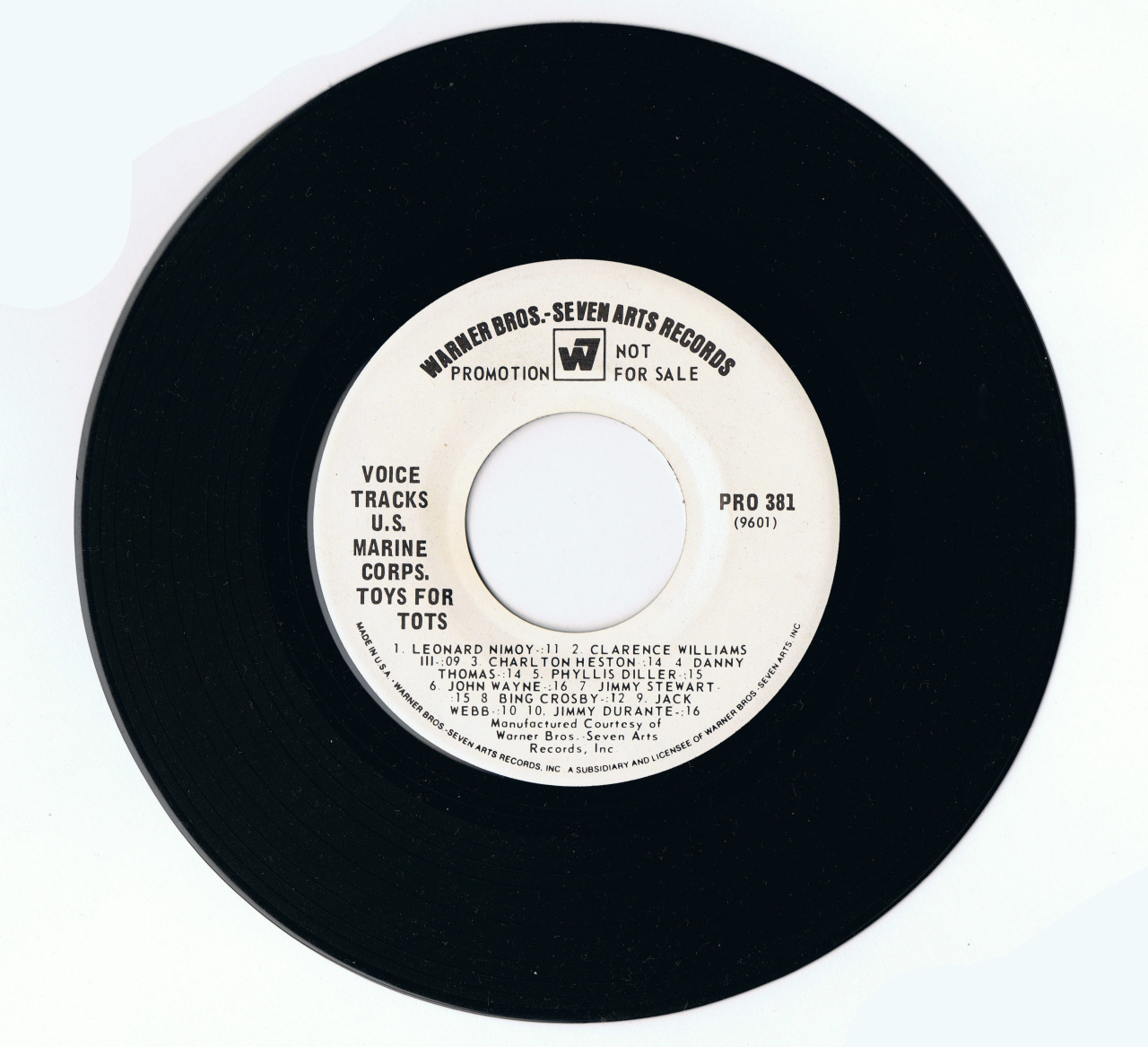 Mr. Nimoy was already doing Mission Impossible when this PSA was recorded. (more/close)
Mr. Nimoy was already doing Mission Impossible when this PSA was recorded. (more/close)
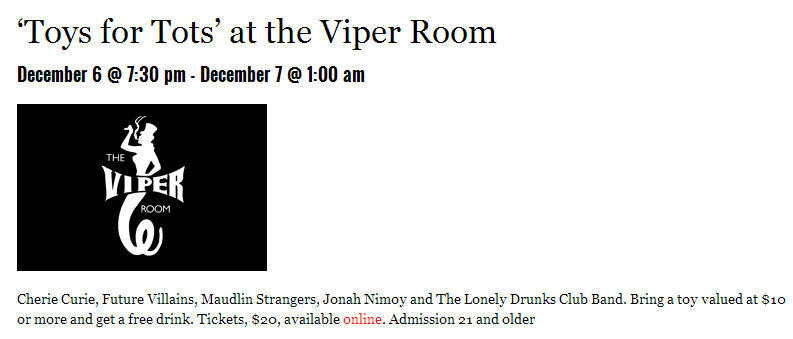
Looks like Mr. Nimoy’s grandson, Jonah, is following in his footsteps providing support for “Toys for Tots” in 2014.
Voices of Vista (1968)

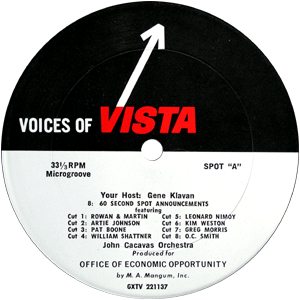 (more/close)
(more/close)
Voices Of Vista
# 146
Office Of Economic Opportunity
By M. A. Mangum, Inc.
Year Released:1968
A government sponsored radio show promoting VISTA, Volunteers In Service To America, people working against poverty. Hosted by Gene Klavan. This LP has a fun interview with Nimoy about his new release on Dot Records, as well as his previous LPs. It also features five songs from the LP, The Way I Feel. All VISTA LPs released in blank sleeve covers.
Running Time: 23:50
Voices Of Vista
GXTV 221137
Office Of Economic Opportunity
By M. A. Mangum, Inc.
Year Released:1968
This record has three radio promo spots recorded by Leonard Nimoy. One 60 second spot on Side A and two 30 second spots on side B. This set and the one above also includes interviews and spots by William Shatner. Shatner aslo did a full VISTA interview, show #147.
Listen to excerpts at Maiden Wine
Voices of VISTA
William Shatner and Leonard Nimoy Three radio shows on CD (originally distributed to radio stations on LPs) Back in 1968 Leonard Nimoy and William Shatner appeared on a radio series called "Voices of VISTA." Distributed free to radio stations, the series promoted "Volunteers In Service To America," an agency that placed volunteers in low income areas for a year. The radio shows were designed to explain what the VISTA mission was and how to apply for the program.
During the time these shows were produced both Shatner and Nimoy had released record albums of their singing.
Here are the contents of the three shows available on this CD:
VISTA #146 - Leonard Nimoy
Songs by Nimoy:
I'd Love Making Love to You
Here We Go Round Again
Hitchhiker
If I Had a Hammer
Sunny
Nimoy also discusses his acting career, earlier albums and signing up for "Star Trek"
VISTA #147 - William Shatner #1
Songs by Shatner:
Hamlet/It Was a Very Good Year
The Transformed Man
Shatner also discusses his early acting career in Canada and New York
VISTA #148 - William Shatner #2
Songs by Shatner:
Henry V/Elegy for the Brave
No Thank You by Cyrano de Bergerac/Mr. Tambourine Man
Shatner also discusses his signing for "Star Trek" and his earlier series "For the People"
Each show is approximately 24 minutes long.
Two Sides of Leonard Nimoy (1968)
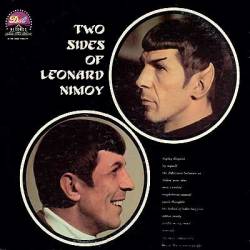
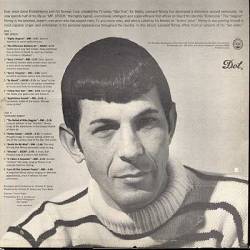 Review and more at Stax of Wax. This record contains the infamous Ballad of Bilbo Baggins. In an interview with The Boston Phoenix Mr. Nimoy said about the song: "I have a certain kind of pride connected to that piece. It was done, I think, in the early ’70s, 30 years ahead of the Lord of the Rings cycle. It’s a fun piece for kids. It’s amazing that it now has this big life. It also points to another issue, which is that, fairly recently, some kids were having a conversation with President Obama and someone asked him advice about building a political future and he said, 'Be careful what you put on Facebook, because that stuff will show up.' So, there it is." Watch Bilbo on YouTube. This page also has a reprint of an interview "Although Leonard Nimoy Is A Star He's Still His Mama's Boy" (more)
Review and more at Stax of Wax. This record contains the infamous Ballad of Bilbo Baggins. In an interview with The Boston Phoenix Mr. Nimoy said about the song: "I have a certain kind of pride connected to that piece. It was done, I think, in the early ’70s, 30 years ahead of the Lord of the Rings cycle. It’s a fun piece for kids. It’s amazing that it now has this big life. It also points to another issue, which is that, fairly recently, some kids were having a conversation with President Obama and someone asked him advice about building a political future and he said, 'Be careful what you put on Facebook, because that stuff will show up.' So, there it is." Watch Bilbo on YouTube. This page also has a reprint of an interview "Although Leonard Nimoy Is A Star He's Still His Mama's Boy" (more)
Leonard Nimoy Presents Mr. Spock's Music from Outer Space (1967)
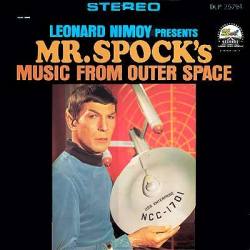
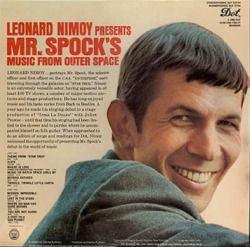 Review and more at Stax of Wax. Here is another, albeit less kind, review of the record and this page offers scans of alternate covers and singles from the album. (more)
Review and more at Stax of Wax. Here is another, albeit less kind, review of the record and this page offers scans of alternate covers and singles from the album. (more)

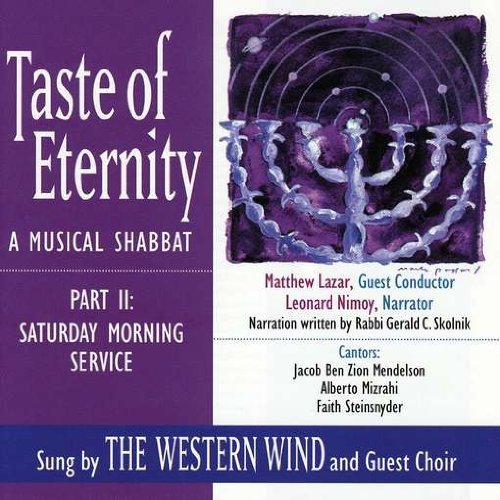 More
More 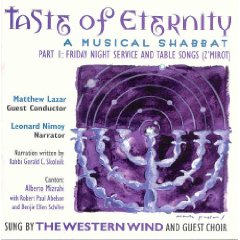 More
More 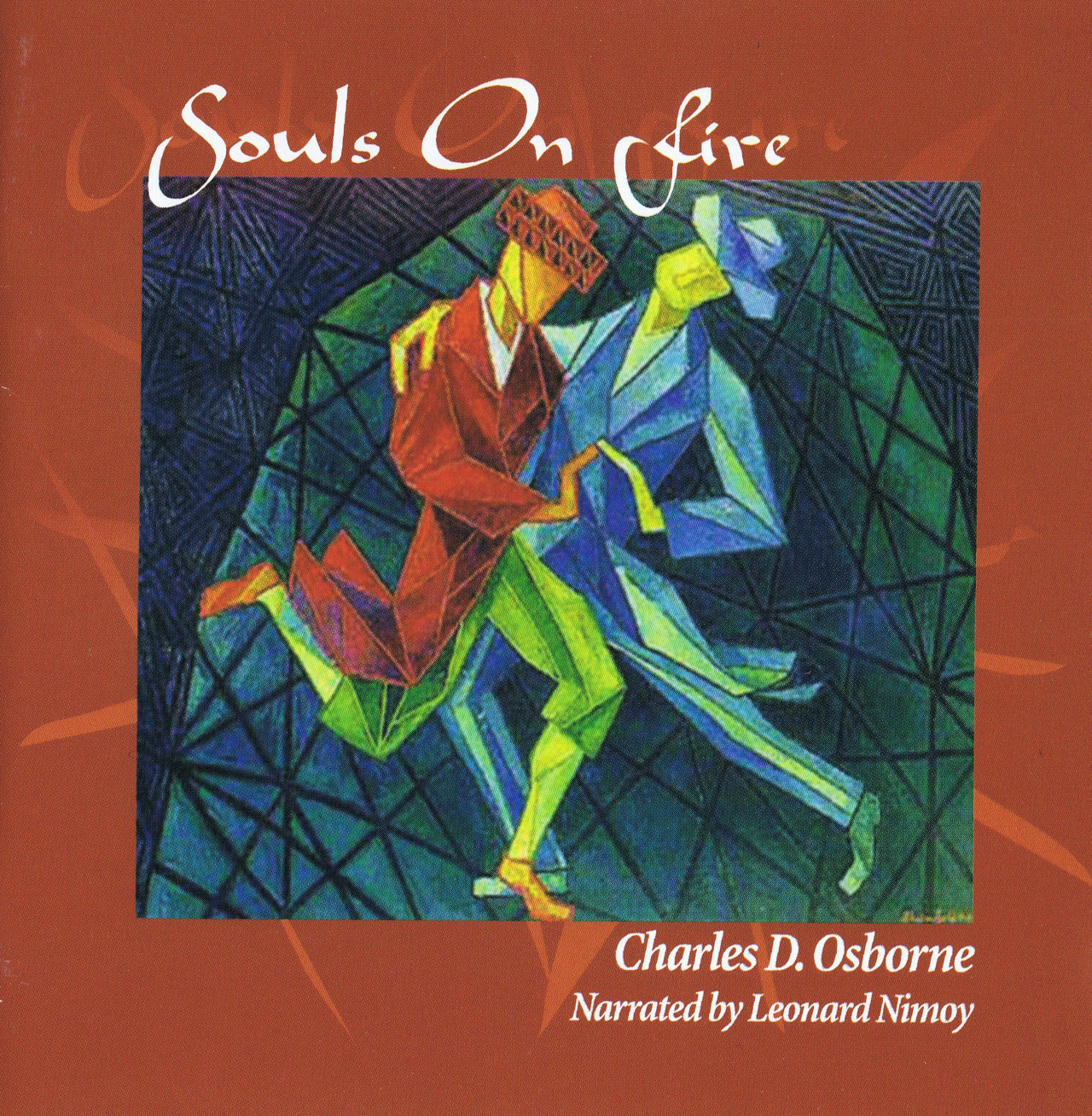
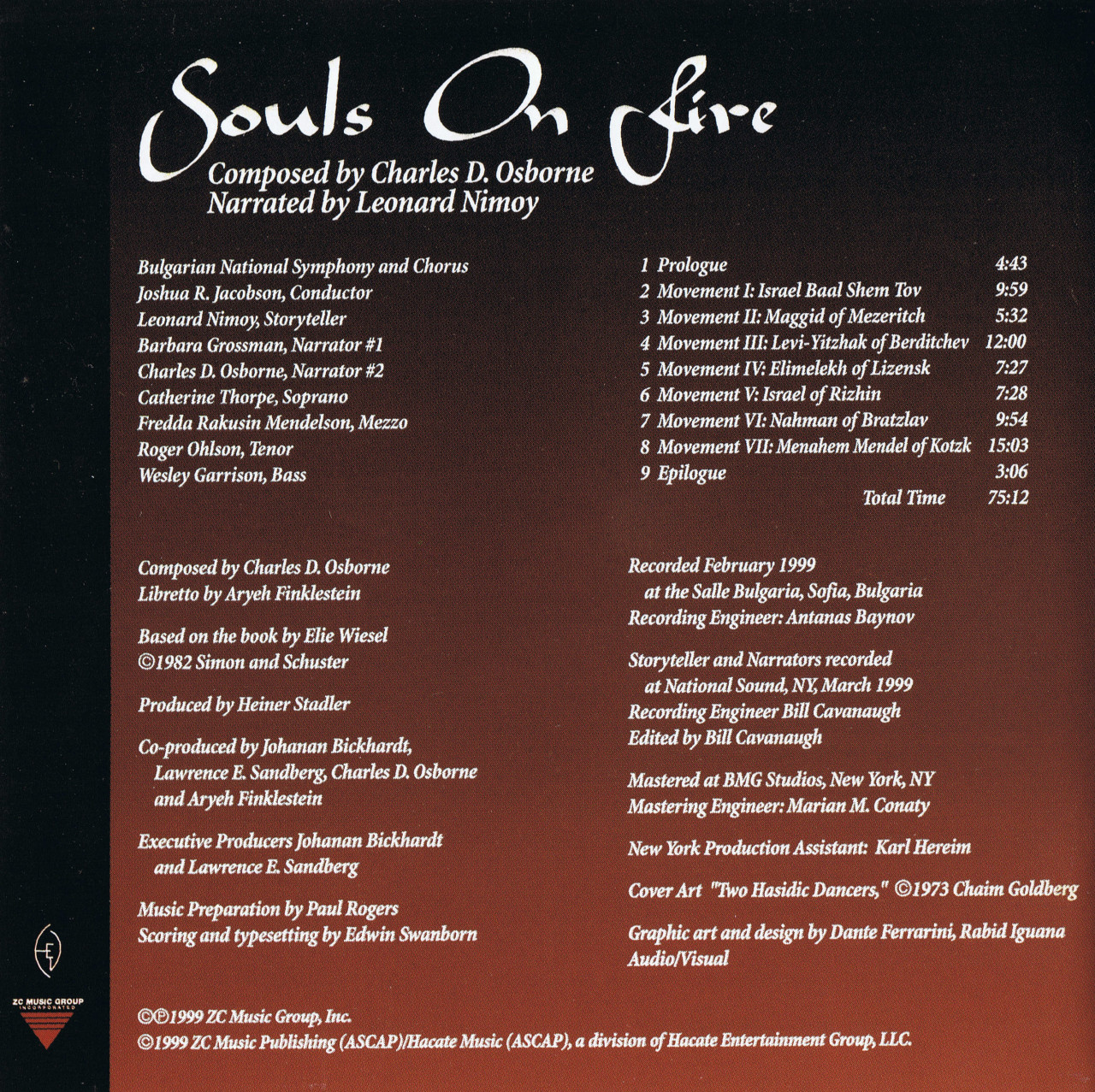
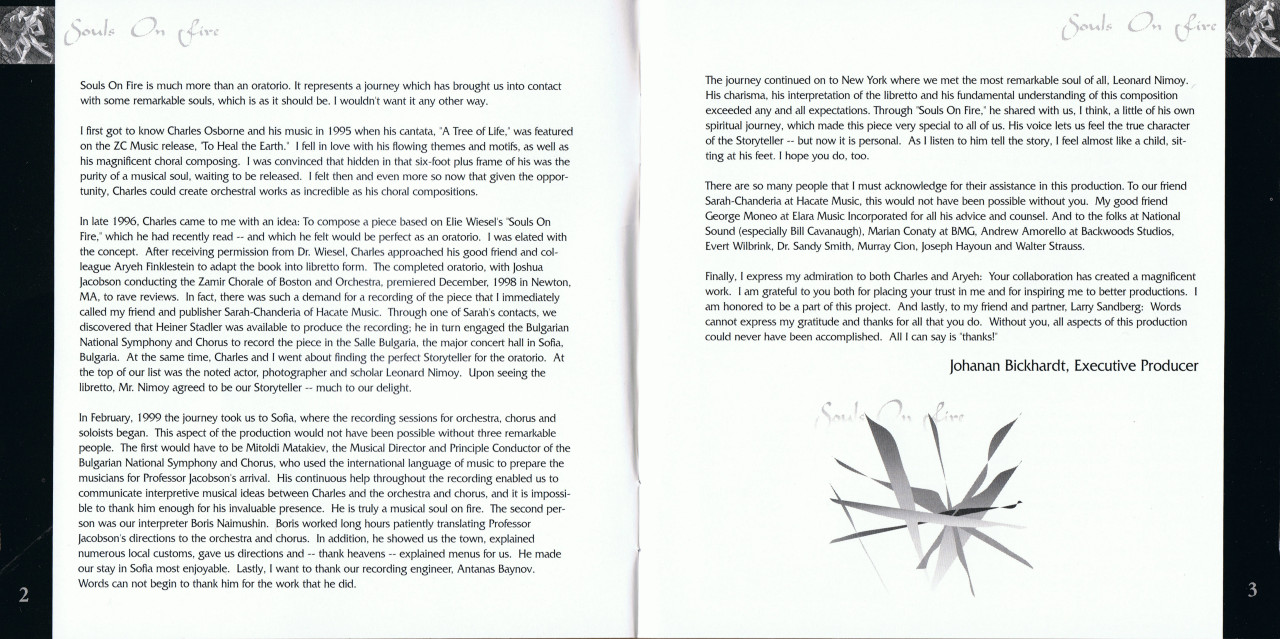
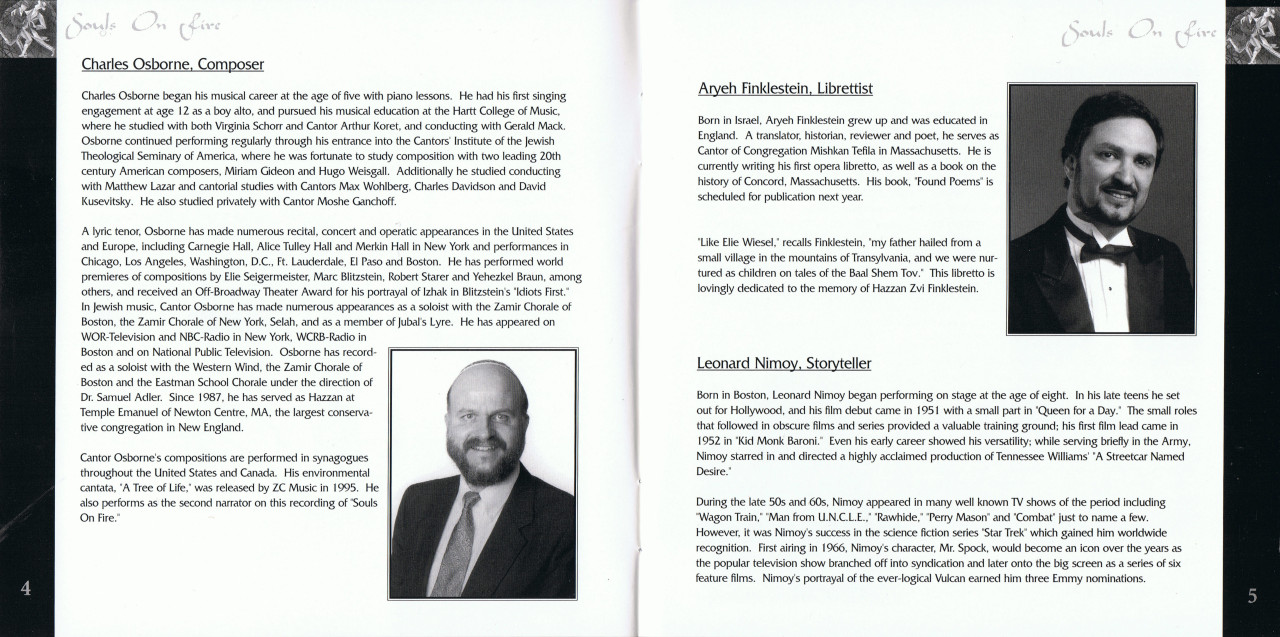
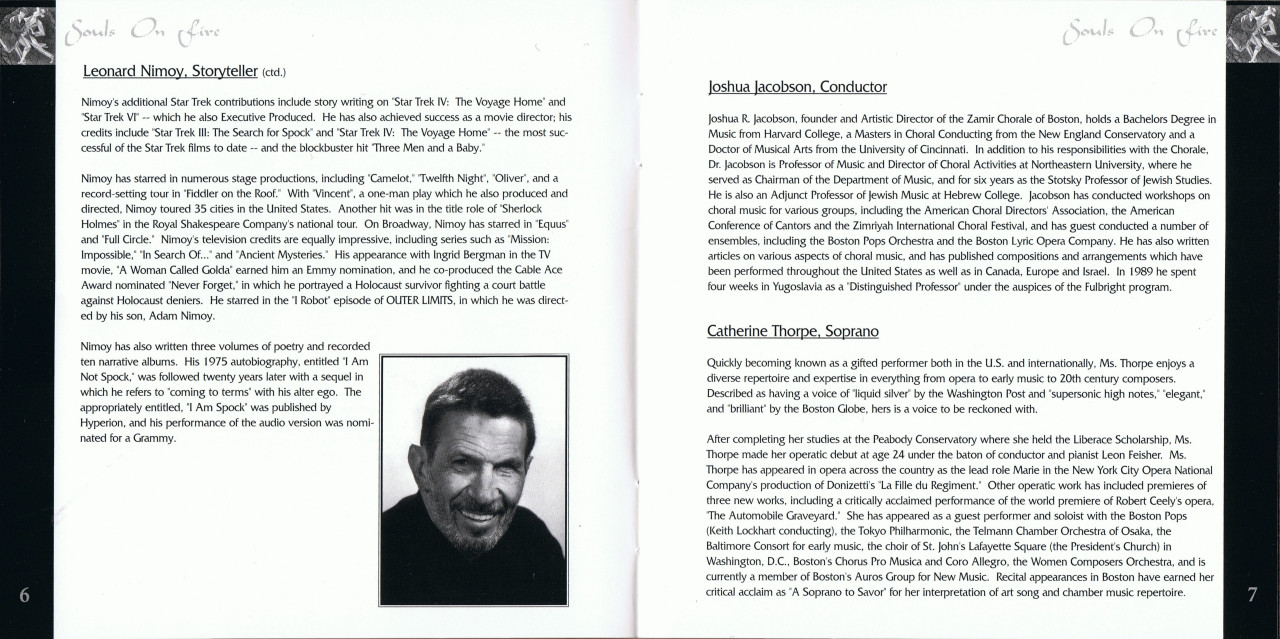
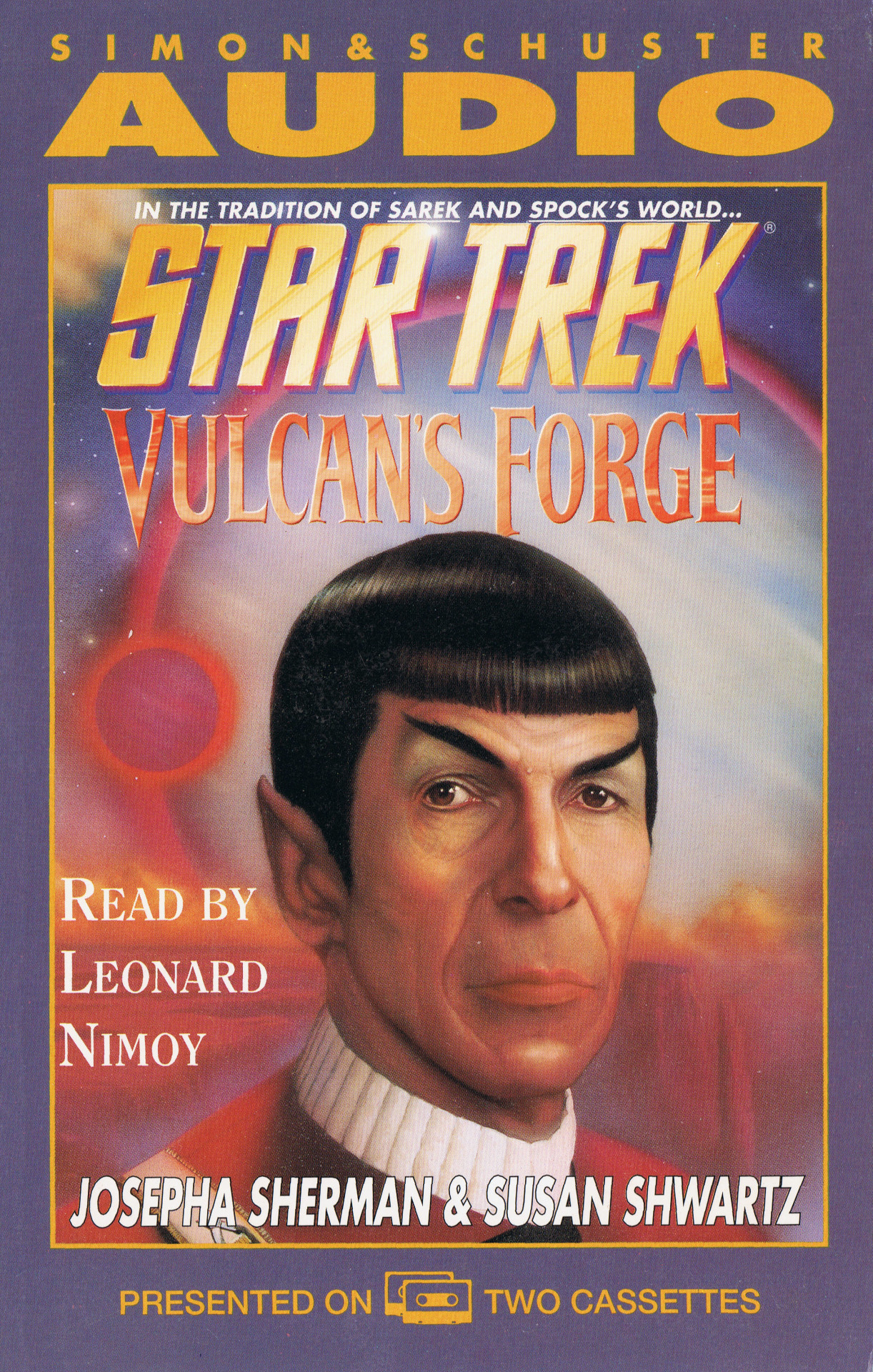
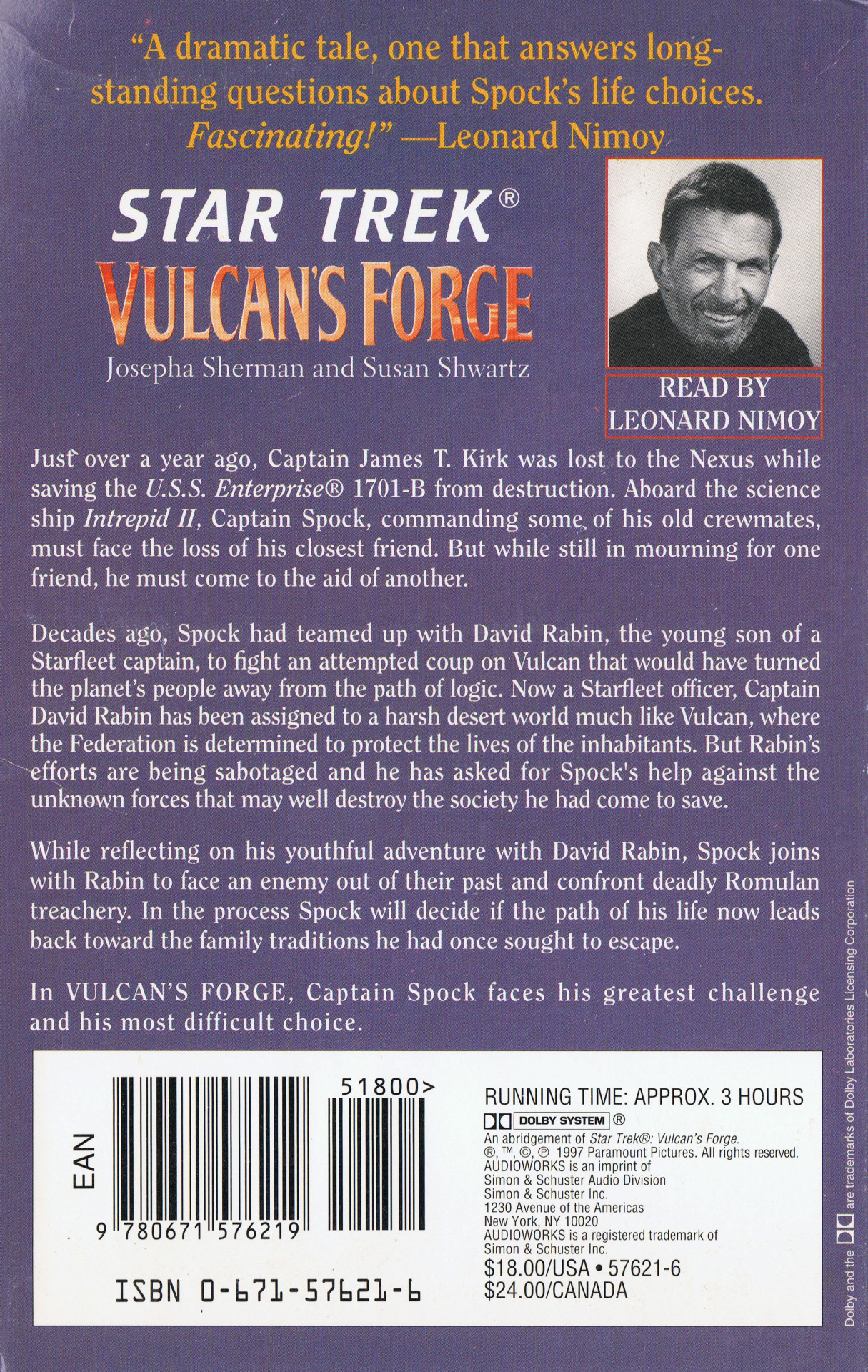
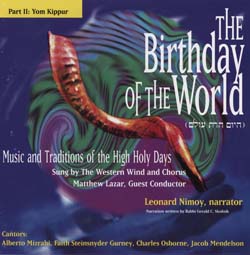 Listen to it
Listen to it 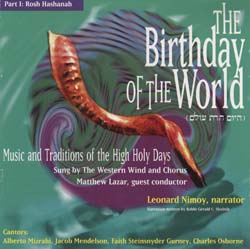 Listen to it
Listen to it 
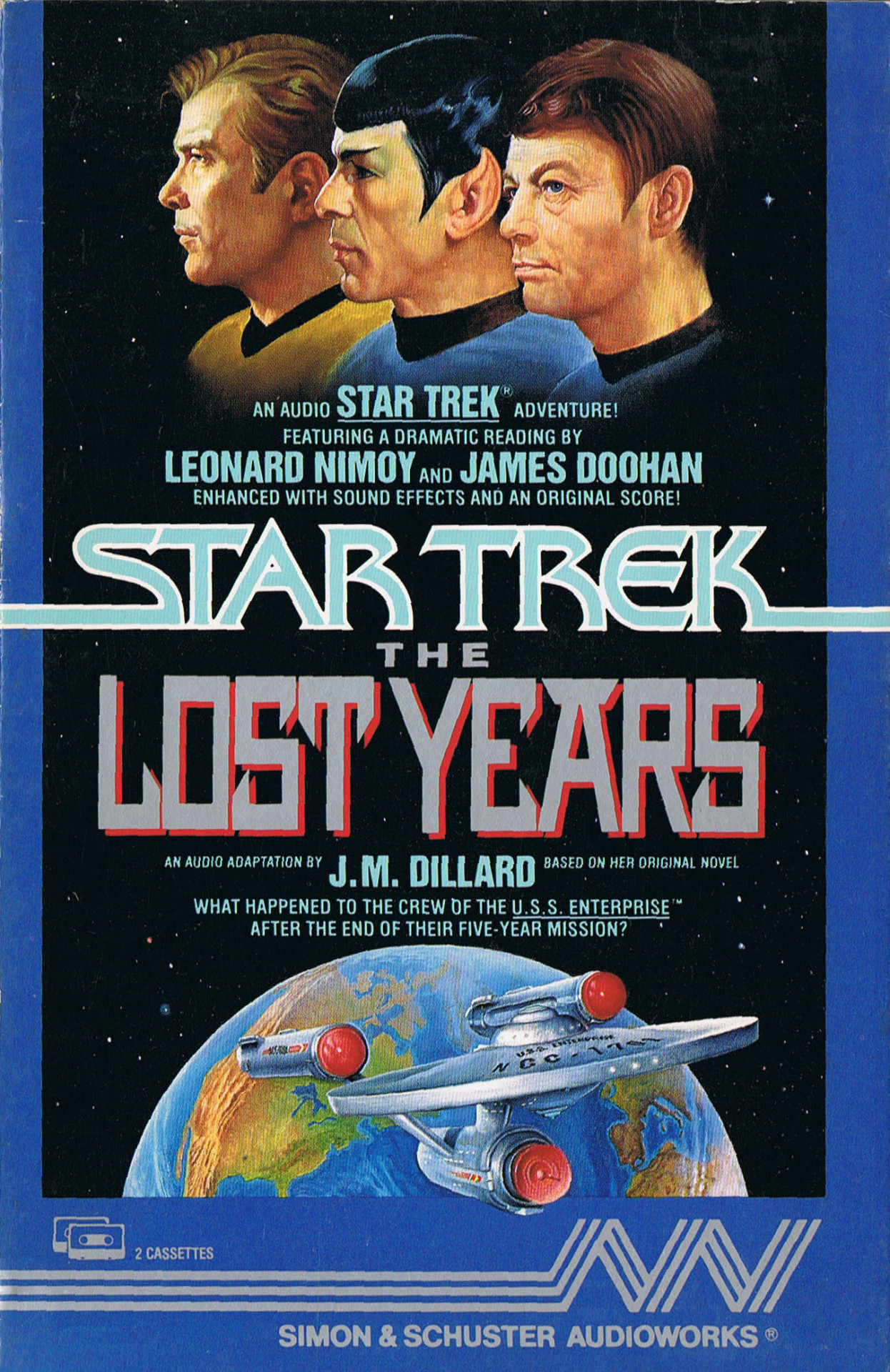

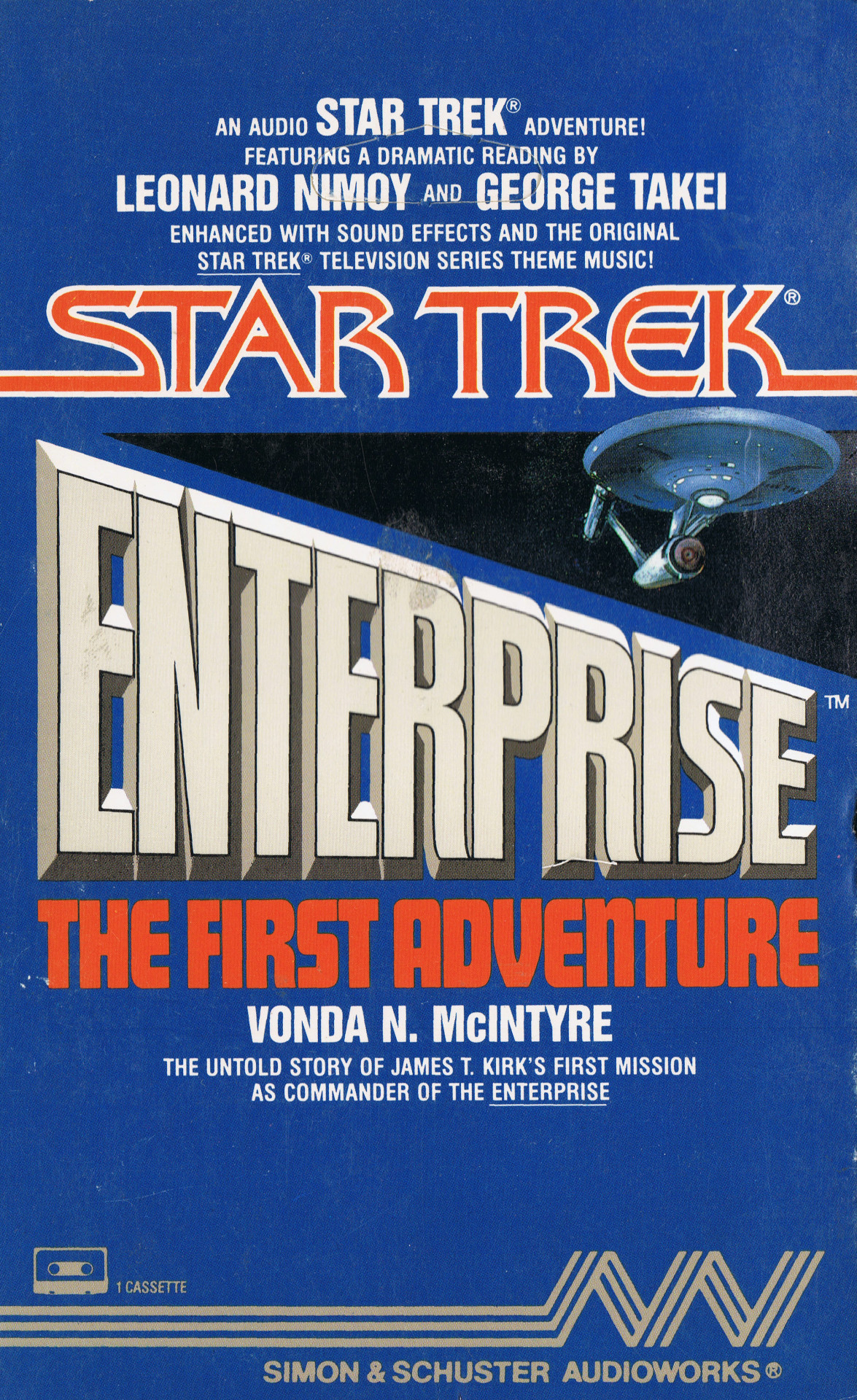
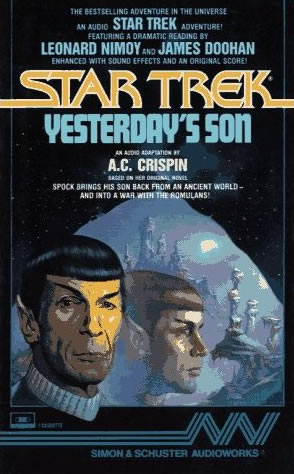
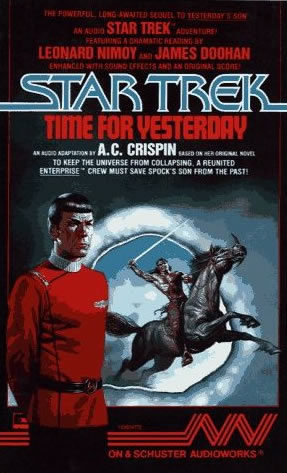
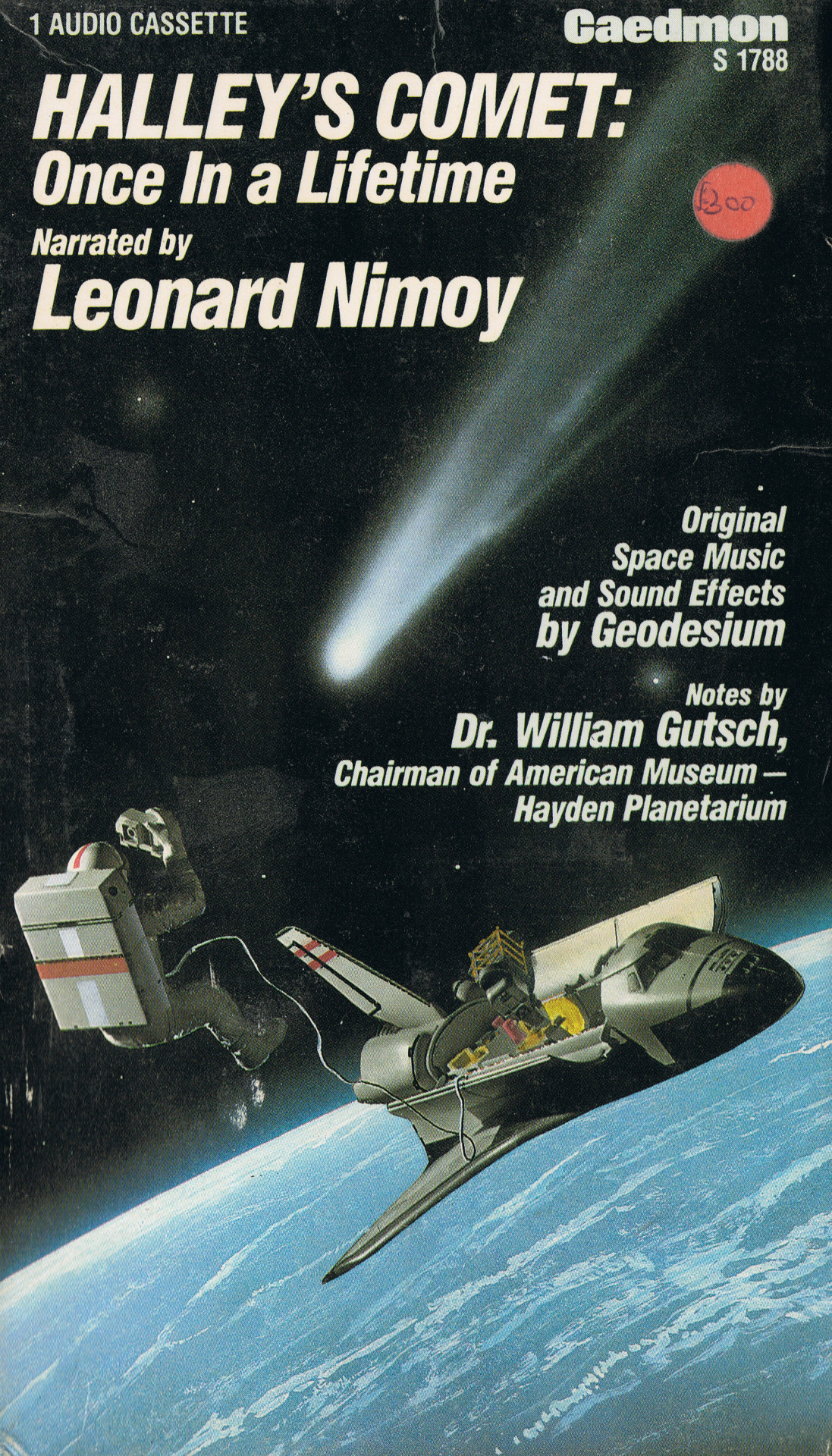
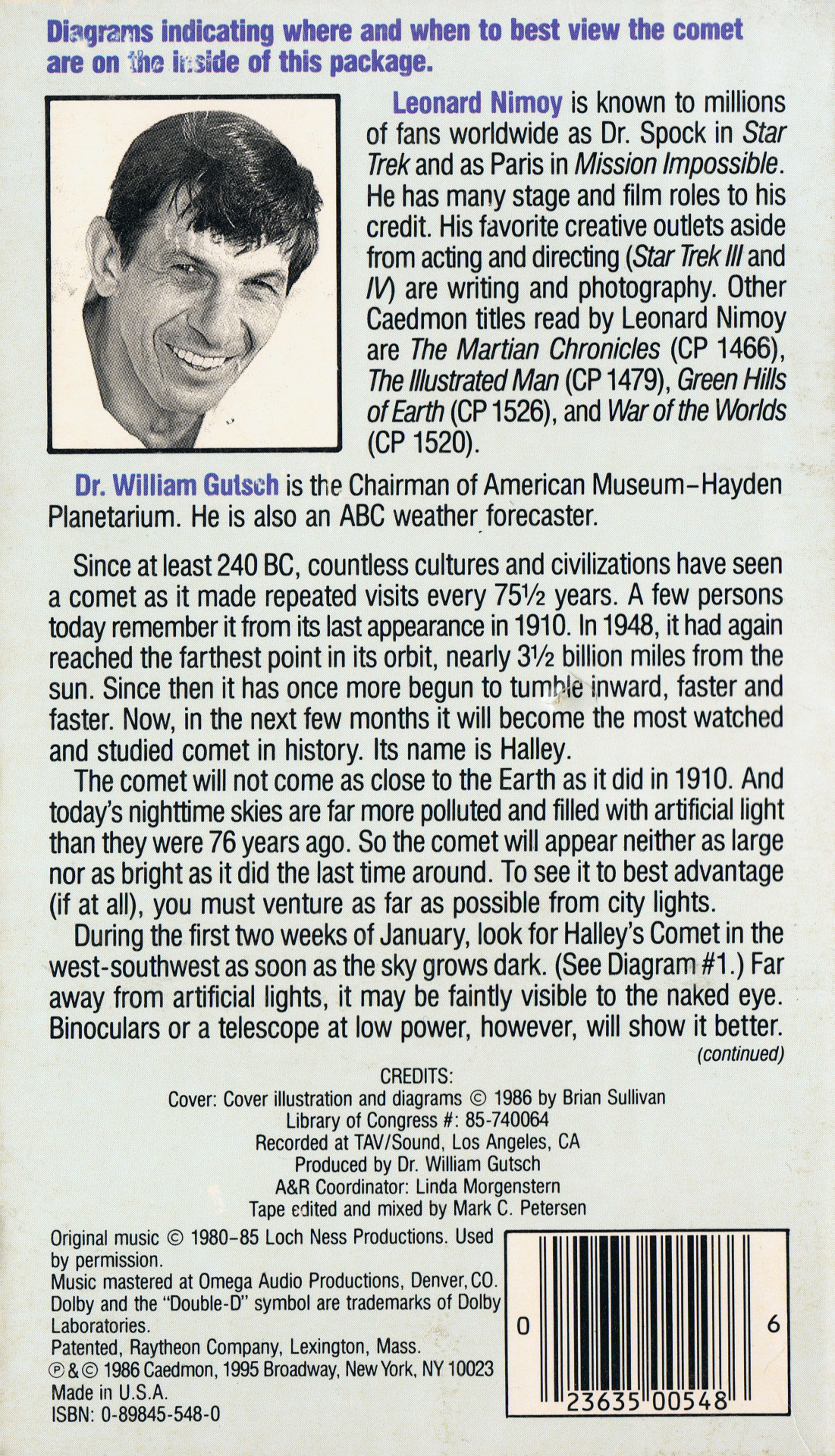

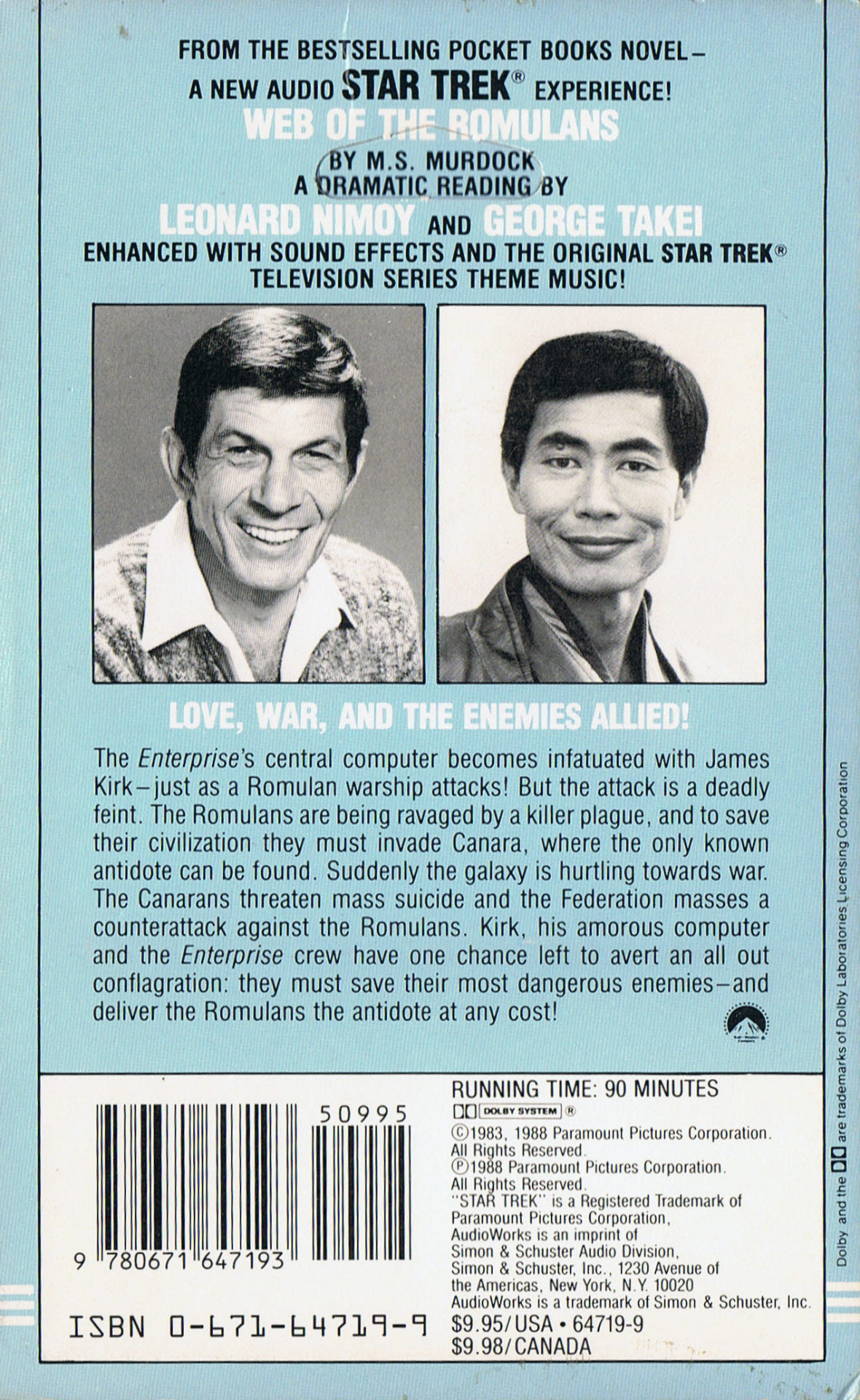
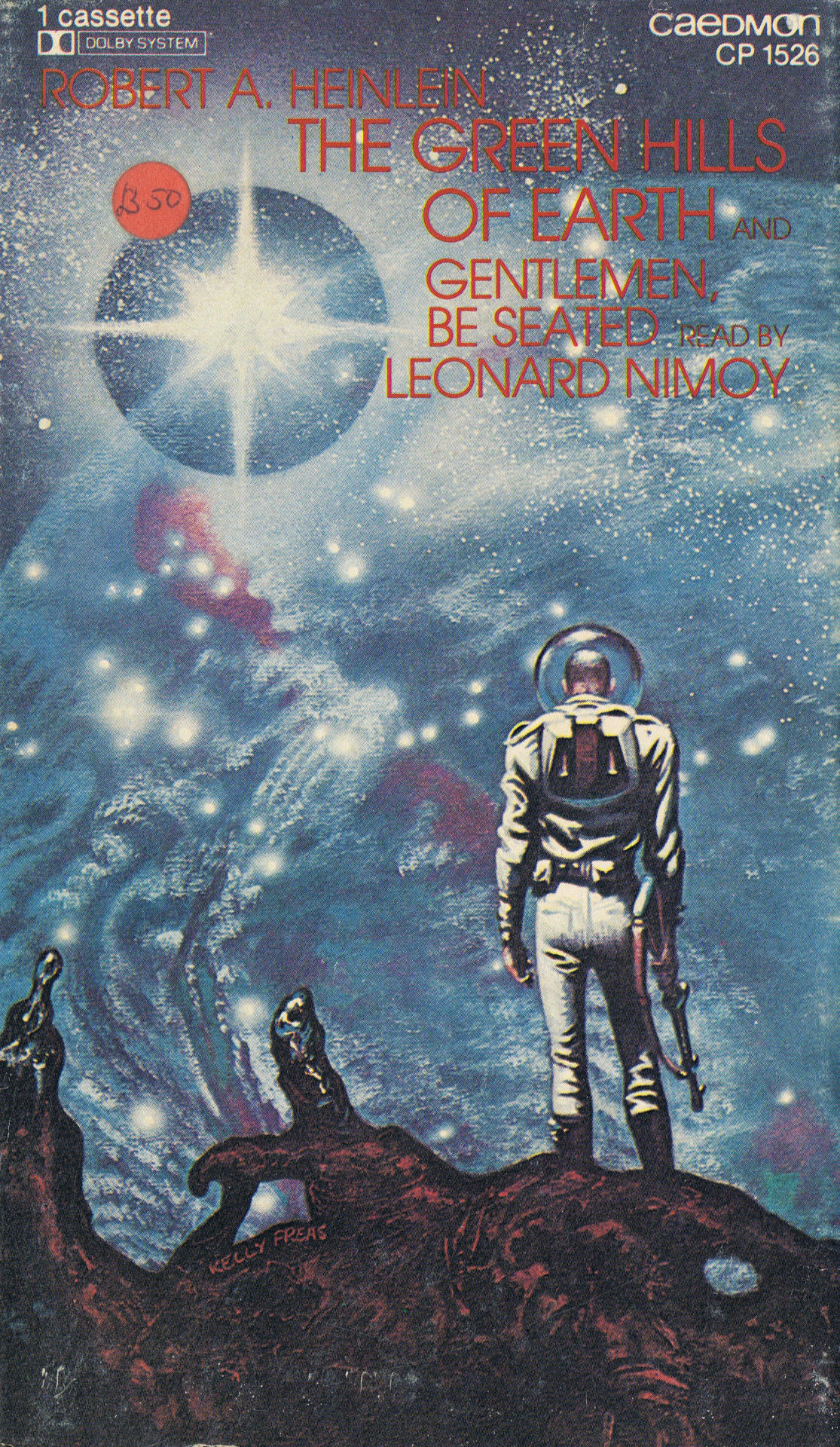
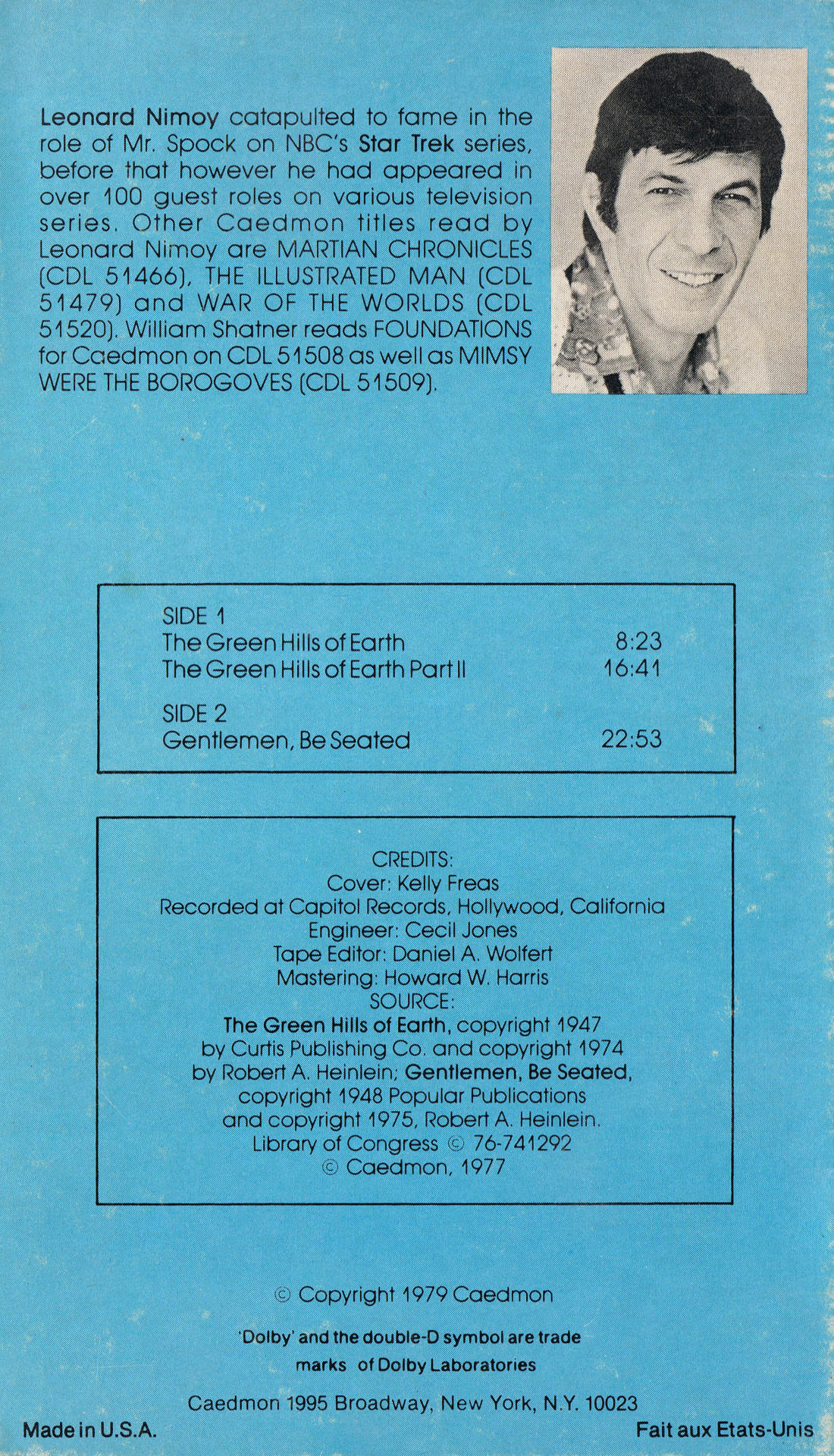

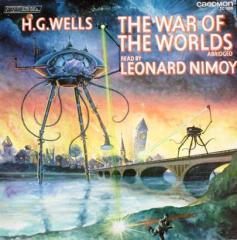 A review for War Of The Worlds can be found
A review for War Of The Worlds can be found 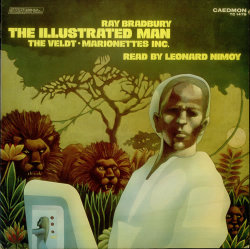
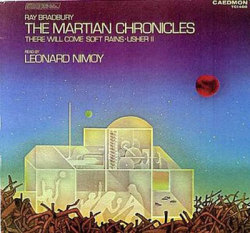

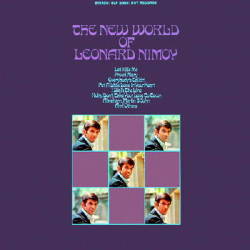
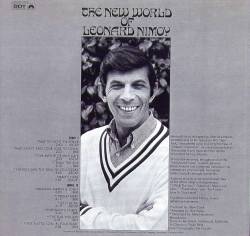 Review and more at
Review and more at 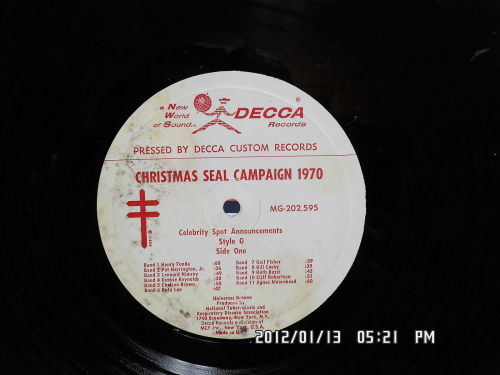 Listen or download
Listen or download 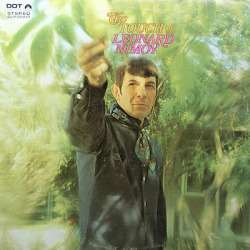
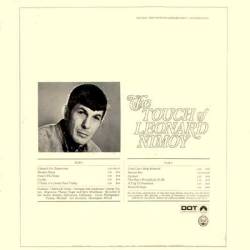 Review and more at
Review and more at 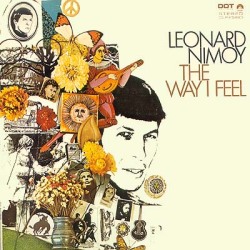
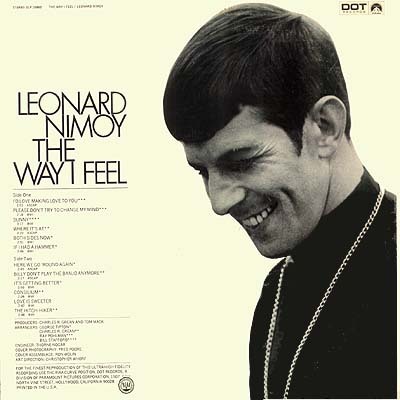 Review and more at
Review and more at 